- Skip to main content
- Prospective Students
- Current Students
- Apply Apply
- Follow Us


Unlocking Possibilities: What Can You Do With a PhD in English?

The world of academia has long been associated with the pursuit of knowledge, scholarly research and teaching careers. For years, earning a PhD in English was almost synonymous with pursuing a career within academia. But, as the landscape of education and industry continues to evolve, so do the options available to English PhD graduates.
The assumption that an academic career is the sole path for English PhDs is shifting, revealing a multitude of exciting and rewarding alternatives.
Is a PhD in English on your to-do list? Get all the facts before you apply — find out if a humanities PhD is worth it for you!
Shifting Focus: the State of Employment in Academia
Traditionally, tenure-track positions were the ultimate goal for aspiring academics. But the job market has become increasingly competitive, leaving a limited number of academic jobs for English Phds seeking employment. Moreover, the rise of adjunct positions, which offer less stability and fewer benefits, has created an environment where job security in academia is more elusive than ever — even well-qualified English PhDs can find themselves navigating through a maze of adjunct positions and temporary contracts.
As a result, English PhDs are reconsidering the assumption that academia is their only option. This shift in academia’s landscape has sparked a conversation about the need to broaden career horizons and consider alternative paths that utilize the skills and knowledge gained during doctoral studies.
Exploring Alternatives: English PhD Jobs Outside of Academia
The desire for stability and a healthier work-life balance is a driving factor for many scholars leaving academia. The uncertainty surrounding tenure-track positions, coupled with the pressure to publish prolifically and compete for dwindling opportunities, has led many to seek alternatives in various industries and fields.
On the bright side, English PhDs are uniquely qualified to work in nearly any field and the skills acquired during their study are highly transferable. Critical thinking, research proficiency, effective communication and the ability to analyze complex narratives are all qualities that can be applied to a wide range of career options.
The Expansive Landscape of Non-Academic Careers
While tenure-track positions in academia are few and far between, the world outside the academy is teeming with opportunities that align with the skillset and passion of English PhDs. Here’s a glimpse into the exciting array of non-academic careers English PhDs are well suited for:
1. Content Strategist and Brand Storyteller:
English PhDs thrive in the realm of content strategy and brand storytelling. Their profound understanding of narratives and language nuances can transform English PhDs into sought-after content creators, crafting compelling stories that resonate with audiences across industries.
2. Media and Communication Specialist:
Mastery of language empowers English PhDs to excel in media and communication roles. Whether crafting press releases, managing social media content, or curating engaging digital campaigns, their ability to convey messages effectively is invaluable.
3. Technical Writer and Documentation Expert:
Navigating the world of technical writing, where clarity and precision reign, is second nature for many English PhDs. Their meticulous analysis and eloquent communication make them proficient creators of user manuals, guides and documentation for intricate subjects.
4. Cultural Critic and Reviewer:
English PhDs know how analytical prowess can shape cultural discourse. Becoming critics or reviewers for literature, art, film, or even pop culture is an avenue where English PhDs can use their insights to influence public opinion and shape trends.
5. Marketing Analyst and Consumer Insight Expert:
Armed with finely-tuned research skills, English PhDs are a good fit for market research. As marketing analysts, they decode consumer behavior, unearth market trends and offer strategic insights crucial for business growth.
6. Public Relations and Corporate Communications:
Their knack for persuasive language aligns English PhDs seamlessly with public relations and corporate communications. Managing reputation, crisis communication, and maintaining brand image become their forte.
7. Grant Writer and Nonprofit Advocate:
English PhDs who excel at persuasive writing to make a tangible impact may find their perfect home in the nonprofit space. By becoming a grant writer or working with nonprofits in other ways, English PhDs can contribute to social change and secure funding for noble causes.
8. Publishing Industry Specialist:
As editors, manuscript reviewers or content curators, English PhDs are well-suited to navigate the publishing world. Their discerning eye and deep understanding of literature can contribute to shaping literary landscapes.
9. Entrepreneurial Ventures:
Launching a blog, podcast, or digital platform allows English PhDs to blend their love for literature with modern technology, catering to niche audiences and carving a unique path.
10. Government and Policy Analyst:
The critical thinking skills gained in an English PhD program are assets in governmental or policy roles. Analyzing complex documents, articulating ideas succinctly, and contributing to informed decision-making are roles where an English PhD’s expertise shines.
Earning a PhD in English isn’t just about academics; it's about embracing a multifaceted world of opportunities. The journey you embark on equips you with skills that transcend traditional boundaries. As you step beyond the classroom, remember that your passion for language, critical thinking, and storytelling has the power to redefine industries and carve pathways less traveled. The possibilities are boundless, waiting for you to embrace them and make your mark in an ever-evolving professional landscape.
Learn more about what doctoral study in the humanities can do for you in our guide!

Are you intrigued by the diverse possibilities a PhD in English can unlock? Connect with us at SMU's Moody School of Graduate and Advanced Studies to explore how our program can pave the way for your journey into these exciting career realms. Your expertise has the potential to shape industries and redefine success.

Request more
Information.
Complete the form to reach out to us for more information
Published On
More articles, recommended articles for you, how do you get a phd a guide to the phd timeline.
Everyone who considers a doctoral degree knows a PhD is a big commitment.
Not only will it require...
How to Write a Statement of Purpose for PhD Admission
The dreaded doctoral statement of purpose — every PhD program asks for it, but why is it so...
Spotlight: Ph.D. Alumnus Matthew Babcock
Prof. Matthew Babcock is an Assistant Professor of History at UNT Dallas, where he has worked as a...
Browse articles by topic
Subscribe to.

- Jun 12, 2023
- 11 min read
20 Careers You Can Pursue with an English Literature Degree
It may be one of the most valuable and useful degrees you can obtain.
Melina Theodorou
Career and Culture Writer
Reviewed by Chris Leitch

Unlike conventional wisdom, which tends to underestimate majors in humanities , a degree in English literature has a lot to offer. It allows you to develop an excellent understanding of literary history, as well as enhance your knowledge of various intellectual traditions. In addition, it can teach you transferable skills , such as communication, presentation and research. All of these are highly sought-after by employers!
Finally, studying English literature can open the door to a wide range of career paths down the line. This means that, even if you’re not entirely sure what you see yourself doing in the future, you’ll have plenty of time to figure out what your ideal profession is.
So, since you’re likely in the middle of brainstorming possible scenarios for the future, here are the top 20 careers you can pursue with an English literature degree. We’ve arranged them from the most modest to the highest annual median income!

Average annual salary: $36,680
As a tutor , your main objective should be to use your expertise to guide your students and help them achieve academic success. Your tutees could range from elementary school kids and university students to learners with learning difficulties and even adults who are interested in expanding their knowledge in a particular area of study.
A significant advantage to tutoring is that it comes with a lot of flexibility, too. You could offer tutoring sessions online and at home, or work for a school or an academic institution.
19. Administrator
Average annual salary: $39,680
Administrators are essential within every company; this role calls for excellent organizational, leadership and communication skills . Your duties will involve answering phone calls and emails, liaising with clients and other staff, arranging appointments, as well as managing departmental budgets.
If you enjoy working within fast-paced office environments but also the interpersonal aspects involved in front-facing positions, this could be viable career path.
18. Copyeditor
Average annual salary: $45,410
If you have a knack for grammar and a sharp eye for detail , you can use these skills to your professional advantage. Copyeditors are responsible for checking written documents for errors, including syntax, grammar and punctuation, as well as the clarity and style of a text.
To do this job, you need to be able to catch any inconsistencies, repetition and factually incorrect statements through meticulous reading and research.
17. Editorial assistant
Editorial assistants can work within various fields, including book publishing, newspapers and magazines, digital media sites, and corporate companies. While the material you’ll be editing and assisting with may vary across these sectors, you’ll generally be required to research various topics, proofread texts and support editorial staff with other tasks.
While this may be considered as an entry-level role, it’s a great way to break into these industries and work your way up to other roles.
16. Journalist

Average annual salary: $48,370
As an English lit graduate, critical thinking, communication and writing are the Holy Grail of your transferable skills. These also happen to be essential assets for a career in journalism .
Your options here are quite diverse: you could be a print reporter, a broadcaster for a news agency, a staffer for an online magazine, or a columnist for a local newspaper. There’s also plenty of entry points in this career: you could do a master’s, complete an internship , or land an entry-level role before climbing up the ladder.
15. Translator
Average annual salary: $49,110
If you’re bilingual, you could use your language skills to translate written and oral material. It’s important that you’re equally fluent in both languages, however, as you need to ensure that your translated work preserves the meaning of the original text.
From books to movie subtitles and articles to videos, you could work with diverse media and use your English literature knowledge as a competitive advantage — having a specialty is always a plus.
14. Paralegal
Average annual salary: $56,230
Does this entry surprise you? It shouldn’t! English majors can be paralegals , and the reason for this is that, at college, they gain precious relevant skills. These include research, citation, critical thinking and, of course, writing skills.
In their day to day, paralegals assist lawyers by organizing documentation, drafting correspondence, conducting research and gathering facts for cases.
So, if during your studies you realize you don’t want to teach or get into technical or creative writing in the future, you can finish your degree and enroll in a certificate in paralegal studies after. As long as it’s a program that’s approved by the American Bar Association, you’ll be able to break into the world of law.
13. Academic librarian
Average annual salary: $61,190
Ask an English literature graduate what their ideal job would be, and a lot of the times you’ll get a similar response: something to do with books .
Working as a librarian, however, involves a lot more than book-shelving and book-stamping. Indeed, academic librarians offer general and subject-specific research help. Not only that, but they’re also responsible for expanding and managing book collections, contributing to academic course developments and organizing library resources.
12. Teacher

Average annual salary: $61,320
Though teaching is not the only thing that literature graduates can build a career out of, it’s a viable, popular choice for many. As a subject, however, teaching is not one-dimensional; for example, you could work with young children as an elementary school teacher or with teens as a high school teacher. Alternatively, you could teach English as a second language to adults or young learners — and travel the world while you’re at it.
If this is something you want to pursue, consider applying for a master’s degree in education or official teacher training courses so you can secure your qualified teacher status (QTS). You could also look into TESOL courses such as CELTA and TEFL.
11. Web editor and content manager
Average annual salary: $63,350
Remember those transferable skills I just mentioned? Editing and proofreading should also hold a prime spot on your list.
As a web editor and content manager, you’ll be responsible for the written and visual content produced and shared by companies. This often involves working with SEO tools to drive traffic to the website, monitoring the performance of content, and planning a detailed content strategy.
10. Freelance writer
Average annual salary: $69,510
Taking the path of freelancing will allow you to get a flavor for different kinds of writing projects, learn to manage your time independently, and create the schedule that suits you. You could be preparing content for social media one day and writing up an article the next!
Plus, thanks to the internet, you’ll be able to collaborate with companies or other professionals from all around the world, with no restrictions to how much or how little you work.
As landing a full-time writing career can take some time when you’re fresh out of college, freelancing is a great way to gain work experience as you explore your options.
9. Digital copywriter
If you have a way with words , copywriting could be a good profession for you.
Copywriters are a valuable asset for companies. Their job requires them to produce persuasive and eye-catching copy that can boost the visibility of a business or a product.
But coming up with catchy content isn’t all there is to this role. Indeed, copywriters are required to conduct thorough research, find statistics, and interview experts before putting pen on paper. As for the content, it can range from blog posts to social media captions and magazine copy.
8. Publisher

Average annual salary: $69,510
If your dream is to work within publishing, then there are various roles you could pursue, including that of a literary agent, a production editor or a publisher. The latter lies in the top tier of the industry and involves overseeing the editing, design and production of books and manuscripts.
To earn yourself the publisher title, you need to climb your way up , usually from an intern position to a permanent role within a publishing company.
7. Lexicographer
Average annual salary: $78,060
As an English literature graduate, you’ll understand the impact a single word can have on a text, speech or conversation. Lexicographers, who fall under the category of technical writers, research new words and are responsible for upkeeping and putting together dictionaries.
As the years go by, new expressions become part of mainstream speech, and lexicography ensures that the origins, usages and meanings of these words are documented.
In terms of their duties, lexicographers are the ones who get to define new words, ensuring that their descriptions are both accurate and current. A typical day in the life of a lexicographer involves working in an office, researching, editing and proofreading material.
6. Technical writer
Technical writing involves putting together technical manuals, instructional guides and reports. If you enjoy writing but are more of a rational thinker without a creative flair, this could be a good match for you!
Sectors such as manufacturing, IT, engineering, biotech and finance need technical writers to present information in a clear, constructive and unambiguous manner while employing user-friendly language. Your work may also span from briefs, press releases and policies.
5. Professor and lecturer
Average annual salary: $79,640
If you’re passionate about academia, then why not build a career within it? Whether you want to study the linguistic patterns of English, research literary styles, explore radical critical theories or focus on postmodern poetry, you can do so by completing a master’s and a PhD in any of these areas.
After that, you can work as a professor and lecturer in different universities, colleges and educational establishments while undertaking research and teaching subjects you’re truly passionate about.
4. PR manager
Average annual salary: $119,860
A PR manager’s job can take them from NGOs to universities and large corporations to government agencies. Their work revolves around creating and maintaining a good public image for their employer through conferences, interviews and social media.
To do that, you need to be a creative individual with excellent communication skills which you can use to act as the representative of your company.
3. Education policy analyst

Average annual salary: $122,510
If you’re passionate about education, then this role could be fitting. As an education policy analyst, your job is to research current educational policies, curriculums and ongoing issues to assess their impact on students and their communities. Your role, then, would allow you to advocate for certain changes that could transform educational standards as well as the student curriculum.
Before you can advance to this position, it’s essential to gain experience working within schools first. It may also be advisable to pursue a graduate degree in public policy or education.
2. Social media manager
Average annual salary: $133,380
Do you know everything there is to know about social media?
Working as a social media manager is a versatile and challenging job. It’s also one of the fastest-growing careers out there, with nearly every company now employing professionals to increase their social media presence and boost their brand visibility online.
Not only do you need to curate your employer’s online profile, but you’re also in charge of strategizing social media campaigns, orchestrating the content production and engaging with your online audience.
1. Advertising manager
Average annual salary: $135,030
While this isn’t a role you can land right after graduation, it could be one that you can aspire to and work towards. Plus, it’s one of the highest-paying marketing jobs at the moment.
As an advertising manager, you’ll be in charge of your clients’ advertising campaigns, overseeing every medium including print, socials, TV and online ads. You also get to come up with effective brand strategies to increase visibility, approve content before publication and lead an entire team of staff.
Final thoughts
Though you may be telling yourself that you’ve got to figure out everything right now , it’s okay to need more time. At a time when stress among students seems to be rising each year, it’s imperative that you do your best to take care of yourself.
As we’ve seen, English majors have a lot of choice when it comes to choosing a career. Plus, nothing stops you from switching careers down the line, should you want to! You could, for example, start off with an internship in the publishing industry, and end up teaching English as a foreign language a few years later. Or you might even find yourself pursuing careers which are totally unrelated to your studies. That’s okay, too!
Our advice to you is to speak to graduate students and professors, and start making professional connections as early as possible. The more conversations you have with subject matter experts, the better. Hearing first-hand experiences can help you make concrete decisions for your own career journey.
Which of the careers we talked about are you leaning towards? Leave us a comment and let us know!
Originally published on August 10, 2020. Updated by Electra Michaelidou.
Career Exploration
Language Skills
Culture and Heritage
Education and Teaching
Now accepting applications for the year 2024. Apply Now
- UGC Proforma

- About AAFT University
- Chancellor Message
- Advisory Board
- Recognition & Awards
- Vision and Mission
- National Ragging Prevention Programme
- School of Cinema
- School of Fine Arts
- School of Hospitality & Tourism Management
- School of Doctoral Research
- School of Music
- School of Management
- School of Interior Design
- School of Fashion Design
- School of Animation
- School of Journalism & Mass Communication
- School of Photography
- School of PR & Events
- Pedagogy and Curriculum
- Core Faculties
- Academic Calendar
- Learning Portal
- B.A. Cinema
- B.A. in Journalism &Mass Communication
- Bachelor in Fine Arts
- B.Des. in Fashion Design
- B.Sc. in Fashion Design
- B.Sc in Interior Design
- B.Des. in Interior Design
- B.Sc. in Animation & VFX
- B.A. (Photography)
- B.A. Event Management
- Bachelor in Performing Arts
- BA in Hospitality & Tourism Management
- Bachelor of Business Administration
- M.A. Cinema
- M.A. in Journalism & Mass Communication
- M.A. (Photography)
- M.Sc. in Fashion Design
- M.Des in Interior Design
- Master of Business Administration
- Master in Fine Arts
- M.A. PR and Events
- Masters in Performing Arts
- Diploma in Post Production
- Diploma in Direction
- Diploma in Acting
- Diploma in Cinematography
- Diploma in Journalism & Mass Communication
- Diploma in Photography
- Diploma in Fashion Design
- Diploma in Interior Design
- Diploma in Animation
- Diploma in Event Management
- Diploma in Hotel Management
- Diploma in Fine Arts
- Diploma in Music Production
- Diploma in Dance
- Diploma in Nutrition and Dietetics
- PhD Programs
- How to Apply
- Fee Structure
- Financial Assistance
- Pay Fee Online
- About the campus
- Life @ Raipur
- Infrastructure & Facilities
- Research @ AAFT
- Doctoral Research Program
- Central Research Facility
- Research and Publication
What Are the Job Opportunities After PhD in English?

Embarking on a PhD journey in English opens up a world of exciting career possibilities and paves the way for becoming a subject matter expert in the realm of language, literature, and critical analysis. As a student pursuing a doctorate in this field, you gain specialized knowledge and critical thinking skills that can lead to diverse and rewarding job opportunities. In this article, we will find the various career paths available after completing a PhD in English. So, let’s dive in and discover the exciting prospects that await you!
One of the most common career paths for PhD graduates in English is academia. As a professor or lecturer, you can teach English literature, language, or composition courses at colleges and universities. This allows you to impart knowledge, conduct research, and contribute to the intellectual growth of students.
Research and Writing
A PhD in English equips you with advanced research and writing skills, making you a valuable asset in the research sector. You can work as a research associate or research assistant in academic institutions, think tanks, or research organizations. Additionally, you can pursue a career in technical writing, content development, or as a freelance writer, contributing to publications, magazines, or online platforms.
With your deep understanding of literature and language, you can explore opportunities in the publishing industry. Publishing houses, both traditional and digital, often seek PhD holders to work as editors, proofreaders, or literary agents. You can contribute to the process of manuscript evaluation, editing, and ensuring the quality of published works.
Journalism and Media
PhD graduates in English can find rewarding careers in journalism and media. Your analytical and communication skills are highly valued in these fields. You can work as a journalist, news writer, copywriter, or content creator for newspapers, magazines, online platforms, or broadcasting channels. Your expertise in language and critical analysis will enable you to produce engaging and informative content.
Public Relations and Communications
The ability to articulate ideas and communicate effectively is crucial in the field of public relations (PR) and communications. Your deep understanding of language and culture allows you to excel in crafting compelling narratives, managing social media platforms, and developing PR strategies for organizations, government agencies, or non-profit organizations.
Cultural and Arts Organizations
PhD graduates in English can make significant contributions to cultural and arts organizations. You can work in museums, art galleries, theater companies, or cultural institutions as curators, program coordinators, or researchers. Your knowledge of literature and cultural history adds depth to these organizations, allowing you to promote and preserve cultural heritage.
Corporate Sector
The corporate sector also offers job opportunities for PhD graduates in English. Your analytical skills, attention to detail, and strong communication abilities make you an asset in roles such as content strategist, corporate trainer, communication specialist, or marketing professional. You can contribute to brand development, internal and external communication, and content management.
Completing a PhD in English opens the door to a wide range of exciting job opportunities. From academia to research, publishing to journalism, public relations to the corporate sector, your specialized knowledge and skills are highly valued in various fields. So, if you’re a student considering a PhD in English, know that the possibilities for a fulfilling and intellectually stimulating career are abundant. Embrace the journey, and embark on a path that allows you to make a meaningful impact while pursuing your passion for literature, language, and critical thinking.
Explore. Discover. Connect. Follow us on:
FellowshipBard
Phd in english: requirements, salary, jobs, & career growth, what is phd in english.
A PhD in English is a postgraduate degree that focuses on the study of English language, literature, and culture. The PhD in English program is typically intended to prepare students for careers in research and teaching in the field of English studies.
A PhD in English program often includes advanced study in literary theory, critical analysis, research technique, and linguistics. Furthermore, students are frequently required to complete a substantial research project or dissertation under the supervision of a faculty advisor.
Some common areas of specialization within a PhD in English program include:
- American literature
- British literature
- Comparative literature
- Cultural studies
- Creative writing
- Linguistics
- Rhetoric and composition
How much money do people make with a PhD in English?
The pay of someone with a PhD in English can vary depending on criteria such as their area of specialization, region, and job type.
Academics, such as professors and researchers, can expect to earn between $70,000 and $120,000 per year, depending on their level of expertise, institution, and topic of study. However, compensation for adjunct or part-time faculty employment may be lower.
Working in sectors such as publishing, writing, or journalism may be further choices for someone with a PhD in English. Salaries in these sectors can range greatly, with some employment earning less than $50,000 per year and others receiving six figures.
What is expected job growth with PhD in English?
Individuals with a PhD in English may face varying job development prospects based on their area of concentration and the career route they pick.
However, the U.S. Bureau of Labor Statistics (BLS) predicts that job growth for postsecondary teachers, including those in the subject of English, will be 9 percent from 2020 to 2030.
This expansion can be linked to rising demand for higher education, which includes courses in English and other liberal arts disciplines.
However, competition for tenure-track posts at colleges and universities can be fierce, and many PhD English graduates may find work in non-academic industries such as publishing, writing, or journalism.
What can you do with a PhD in English?
A PhD in English can lead to a wide range of professional prospects in academia and beyond. Here are a few examples of possible job paths:
1. College or university professor: One of the most typical job routes for those with a PhD in English is to become a college or university professor. Teaching English literature and language courses, conducting research, producing scholarly articles and books, and mentoring students are all part of the job.
2. Writing and editing: Individuals with a PhD in English may pursue employment in writing or editing. Positions in journalism, technical writing, grant writing, or working at publishing houses are examples of this.
3. Research and Analysis: Individuals with a PhD in English may engage in research and analysis professions such as market research or data analysis, as their strong research skills and ability to critically examine texts can be useful in a variety of sectors.
4. Arts and Culture: Some graduates may work in the arts and culture sector, such as museums, art galleries, or cultural organizations.
5. Government and Non-profit: Graduates with a PhD in English may also work in government or non-profit organizations in fields such as education, policy, or advocacy.
What are the requirements for a PhD in English?
The specific requirements for obtaining a PhD in English can vary depending on the institution and program, but generally, the following are common requirements:
1. Bachelor’s or Master’s Degree: Applicants to most PhD programs in English must have a Bachelor’s degree from a recognized university. Although it is not usually required, certain schools may accept applicants with a Master’s degree in a related discipline.
2. Academic Transcripts: Applicants are usually expected to present certified transcripts of their undergraduate and graduate education, which demonstrate their academic performance and achievement.
3. Statement of Purpose: Applicants are typically expected to provide a personal statement or statement of purpose detailing their research interests, academic ambitions, and reason for pursuing a PhD in English.
4. Standardized Test Scores: Applicants to many PhD programs may be required to submit scores from standardized tests such as the Graduate Record Examination (GRE) or other related assessments.
5. Letters of Recommendation: Applicants to PhD programs in English are frequently required to provide letters of recommendation from academic or professional sources who may speak to the applicant’s academic talents, research potential, and eligibility for a PhD program.
Looking For Scholarship Programs? Click here
How long does it take to get a phd in english.
The length of time it takes to earn a PhD in English varies based on the school, the speed of the particular student, and other considerations. A PhD in English usually takes between 5-7 years to complete.
The first 2-3 years of a PhD program are often spent studying English literature, theory, and research methodologies. Students will often take comprehensive tests during this time to demonstrate their understanding in these topics.
After completing their coursework, students will typically spend the next 2-3 years working on their dissertation. Conducting original research, analyzing data, and writing a lengthy and detailed dissertation are all part of this process.
Looking For Fully Funded PhD Programs? Click Here
Do you need a masters in english to get a phd in english.
A master’s degree in English is usually not required to apply for a PhD program in English. Many English PhD programs accept applicants with a bachelor’s degree in English or a related discipline, however others may demand extra coursework or research experience.
However, having a master’s degree in English may be advantageous for some individuals because it might demonstrate a higher level of knowledge and preparedness for the additional coursework and research necessary in a PhD program.
What are the Best PhD in English Degree programs?
1. harvard university 2. university of california, berkeley 3. university of chicago 4. stanford university 5. columbia university 6. yale university 7. princeton university 8. university of pennsylvania 9. university of michigan 10. university of california, los angeles (ucla), leave a comment cancel reply.
Save my name, email, and website in this browser for the next time I comment.

Professors Not Responding? Your CV May Be the Reason.
Try Our Ready-to-Use CV Templates Land You in Harvard, MIT, Oxford, and Beyond!
English (Literature), PHD
On this page:.
At a Glance: program details
- Location: Tempe campus
- Second Language Requirement: No
Program Description
Degree Awarded: PHD English (Literature)
The PhD program in English with a concentration in literature trains students in various methodologies, pedagogies and areas of inquiry that constitute literary and cultural studies.
With a diverse and distinguished faculty, the program offers opportunities for specialization in traditional areas of literary criticism, cultural analysis and theory, as well as various fields of interdisciplinary study.
A doctorate in literature equips students with a range of highly sought-after skills and competencies: research and analysis of complex material, communication in written and oral modes, collaboration, independence and self-motivation, creativity and adaptability.
The PhD in English (literature) at ASU is a premier graduate program in the U.S. with strong interdisciplinary ties and faculty links to research centers on campus and in the state, including the Arizona Center for Medieval and Renaissance Studies, the Center for the Study of Race and Democracy, the Institute for Humanities Research, and the Virginia G. Piper Center for Creative Writing. With these resources and a strong mentorship program at their fingertips, our graduates are prepared for a wide array of professional opportunities including careers in college teaching, research, writing, editing, higher education, and humanities-related organizations.
Lee Bebout , Director
Kira Assad, Program Manager
Faculty in Literature
Doctoral Examinations
Doctoral Procedures and Timeline
Teaching Assistantships
Degree Requirements
Curriculum plan options.
- 84 credit hours, a foreign language exam, a written comprehensive exam, an oral comprehensive exam, a prospectus and a dissertation
A student with an appropriate master's degree must complete a minimum of 54 credit hours of approved graduate work, which includes 12 credit hours of dissertation, provided the student's master's degree is accepted by the supervisory committee and the academic unit. Research hours may be used toward coursework in consultation with the advisor.
A student without an appropriate master's degree must complete 84 credit hours of work at ASU. At the advisor's discretion, students may include up to 12 credit hours of appropriate, graduate-level coursework undertaken at another university and not previously counted toward any other degree.
Specifically required are six credit hours in theory courses and ENG 501 Approaches to Research. Students must complete eight graduate courses in any of the following categories:
- cultural studies
- ethnic studies
- gender studies
- history and structure of the English language
- literature 1500--1660
- literature 1660--1900
- literature since 1900
- literature to 1500
- postcolonial or anglophone literatures
Students must take at least five graduate seminars at the 600 level en route to the doctorate, at least three of which must be taken in the doctoral program. Up to 12 credit hours taken outside the department may be counted toward the degree. Students should consult with their supervisory committees when choosing electives.
Admission Requirements
Applicants must fulfill the requirements of both the Graduate College and The College of Liberal Arts and Sciences.
Applicants are eligible to apply to the program if they have earned a bachelor's or master's degree from a regionally accredited institution.
Applicants must have a minimum cumulative GPA of 3.00 (scale is 4.00 = "A") in the last 60 hours of their first bachelor's degree program, or a minimum cumulative GPA of 3.50 (scale is 4.00 = "A") in an applicable master's degree program.
All applicants must submit:
- graduate admission application and application fee
- official transcripts
- statement of purpose
- resume or curriculum vitae
- three letters of recommendation
- academic writing sample relevant to the field
- statement of teaching philosophy (teaching assistantship only)
- proof of English proficiency
Additional Application Information An applicant whose native language is not English and has not graduated from an institution of higher learning in the United States must provide proof of English proficiency, regardless of current residency. Applicants can find more information about English proficiency requirements on the school website . Please note that official scores must be sent to ASU in order for the application to be processed.
The well-considered, one- to two-page, single-spaced statement of purpose should explain the applicant's scholarly background and training, career goals, proposed research specialization, any secondary field of interest and why the applicant wishes to pursue a PhD in English (Literature) at Arizona State University. Applicants applying for funding must also submit a statement of teaching philosophy.
Next Steps to attend ASU
Learn about our programs, apply to a program, visit our campus, application deadlines, learning outcomes.
- Identify and evaluate various disciplinary arguments, trends, traditions and debates within the knowledge community of literary and cultural studies scholars.
- Demonstrate the ability to produce written work of publishable quality.
- Demonstrate research skills necessary to bring a project of literary or cultural analysis to fruition, including the ability to evaluate disciplinary debates and developments; and the ability to produce research on historical and cultural meanings of texts and related cultural productions.
Career Opportunities
Graduates are prepared for careers in higher education and other fields that value this expertise. Sectors employing high numbers of arts and humanities graduates include information and communication, financial and insurance, public administration and defense, arts and entertainment, and education.
Career examples include:
- art director
- criminal investigator or special agent
- intelligence analyst
- market research analyst
- museum curator, educator or exhibit designer
- political analyst
- public relations specialist or manager
- technical writer
Global Opportunities
Global experience.
With over 250 programs in more than 65 countries (ranging from one week to one year), study abroad is possible for all ASU students wishing to gain global skills and knowledge in preparation for a 21st-century career. Students earn ASU credit for completed courses, while staying on track for graduation, and may apply financial aid and scholarships toward program costs. https://mystudyabroad.asu.edu
Program Contact Information
If you have questions related to admission, please click here to request information and an admission specialist will reach out to you directly. For questions regarding faculty or courses, please use the contact information below.
- [email protected]
- 480/965-3194
DEPARTMENT OF ENGLISH
- PhD in Literature
Doctorate in Literature
Interdisciplinary clusters.
The Department of English's Doctoral program in Literature offers advanced study and research in literary history, criticism, and theory, with excellent opportunities for interdepartmental and interdisciplinary study. Courses within the department cover major genres, periods, authors, and a broad range of methodological and theoretical approaches.
The graduate curriculum is enhanced by frequent lectures and workshops with Northwestern faculty and visiting scholars from around the world. Student-organized colloquia, conferences, reading groups, and dissertation groups provide opportunities for students to present their research to an audience of peers.
The PhD program provides superb professionalization and training in a variety of settings, including teaching assistantships for undergraduate lecture courses and the opportunity to develop and lead courses in Northwestern's Writing Program and the School of Professional Studies .
Ten Jobs Where You Can Use Your PhD
By Michelle Lanchart and Stacy Hartman
Earning a PhD provides you with more skills and career opportunities than you might think it does. Below are ten jobs where you can use your PhD—some in academic settings and some not. There are many other opportunities available to you; this list is just a place to start thinking about your career options.*
1. Staff culture writer, digital media company
Staff writers report on artistic and cultural events, providing analysis and context for a broad audience on a variety of topics. As a PhD, you already have the excellent writing and research skills the job requires, and your advanced training in the interpretation of literature, culture, and language enhances your ability to articulate the significance of cultural and artistic phenomena.
2. Dean of students, private high school
A dean of students leads curriculum design, develops academic and behavioral policies, and determines the best strategies to build students’ academic success. The research, leadership, and teaching experience you acquired while earning your PhD makes you a good candidate in this field.
3. Assistant professor, university or college department
An assistant professor teaches undergraduate (and, depending on the institution, graduate) courses, serves on committees that help determine academic and organizational policies for the department and institution, and conducts research, with an eye toward receiving tenure.
4. Research associate, variety of companies
As a research associate you would gather data to determine whether a product or service is desirable to consumers or companies. Your extensive experience conducting research and presenting it to a variety of audiences is a transferable skill that you bring to research associate positions.
5. Development writer, nonprofit or university
A development writer builds relationships with donors and increases public engagement through written and oral communication. Your ability to write about specialized research or technical activities for a general audience is useful for this position.
6. Assistant director, learning programs
Assistant directors have a variety of responsibilities, from providing instructional support to faculty members and graduate students to assessing and improving educational services. This can be an exciting opportunity to apply your teaching and leadership experience beyond the classroom.
7. Associate director, global programs
Associate directors work with faculty members to develop programs and curricula for students studying abroad. Your experiences teaching, developing educational programs, as well as studying, living, and researching abroad, are ideal for this position.
8. Program officer, think tank, foundation, or scholarly association
As a program officer you would take the lead in program development, which involves procuring grants and funding, managing projects, and overseeing budgets. These roles leverage your experience applying for funding and managing complex projects.
9. Copywriter, many companies and organizations
Copywriters produce and edit copy (i.e., writing) for marketing campaigns and then plan and implement those campaigns, which help companies promote products and services across a variety of media. Excellent research and writing skills and an ability to write for different audiences are essential for this job.
10. Curriculum designer, educational technology
Curriculum designers develop educational content and curricula to be delivered digitally to students or employees and often provide technical support to instructors or trainers. This is a great role for those who have developed skills in the digital humanities or in blended learning, and it also leverages your experiences in teaching and in curriculum development.
Your PhD gives you the skills to pursue a variety of career paths. To learn more about how to prepare for the job search and how to gain experience in the industries that interest you, visit the Connected Academics Web site .
*Please note that the job ads are provided as examples and may no longer be accepting applications. A job ad’s inclusion in this list does not constitute an endorsement of the employer by the MLA.

3 comments on “Ten Jobs Where You Can Use Your PhD”
Steve Colburn says:
And don’t forget Government service at the Municipal, County, State, and Federal Level. I know Language and Literature academics who have pursued rewarding careers at all of these levels of Government service to the public, and have received good financial compensation, enjoyed reliable job security, defined-benefit pension programs, and the opportunity to pursue a challenging, rewarding job! Retired Training Manager and Senior Organizational Policy Analyst for Local County Government in Sunny South Florida! Life Member of the MLA, since Grad School in 1976.
Peter Marbais says:
There are a number of language editing opportunities in addition to copy editing. I made the transition from teaching English literature and composition to editing documents for ESL writers aspiring to publish in English-language journals. My experience helping ESL students at the Kent State University writing center and in my composition courses paved the way to helping researchers from around the world. The work is highly rewarding, and there are a number of great resources available online for both contract editors (freelancers) and full-time editors. This link provides a good overview of several types of editing roles: https://www.thebalancesmb.com/freelance-editing-jobs-1360401 .
Peter Marbais, PhD, ELS Quality Control Editor III American Journal Experts, a Research Square company
David -Ross Gerling says:
I made the transition to a law firm in Spain whose clients are Brits and American ex-pats or just foreigners in trouble with the Spanish legal system. My work as ex-pat advocate is every bit as satisfying and infinitely more lucrative than teaching Spanish . David-Ross Gerling, PhD
Leave a Reply Cancel Reply
Your e-mail address will not be published. Required fields are marked * .
You may use these HTML tags and attributes:

Careers for English graduates
English is one of the most rewarding degree subjects you can take at university, giving you the opportunity to study a challenging and diverse range of literature written in English, including poems, fiction, plays and essays. You will get to know the writings of particular authors, movements, and periods in great detail and develop your own interests in English literature and language – interests that we hope will remain with you for the rest of your life.
An English degree will equip you with analytical and writing skills that are readily transferable into many other situations and many professions. It opens up the opportunity to go into a great variety of careers.
Click on the link below to find out which professions our students go into after graduating, and how an English degree can help you develop core highly marketable skills, opening up a wide range of opportunities.
Which careers have our English graduates gone into?
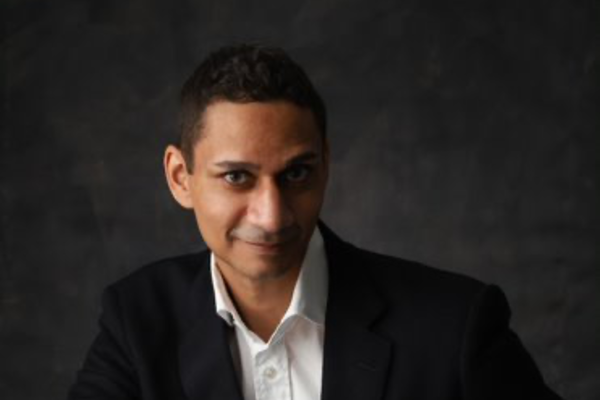
James Nepaulsingh: Corporate lawyer, painter, and musician
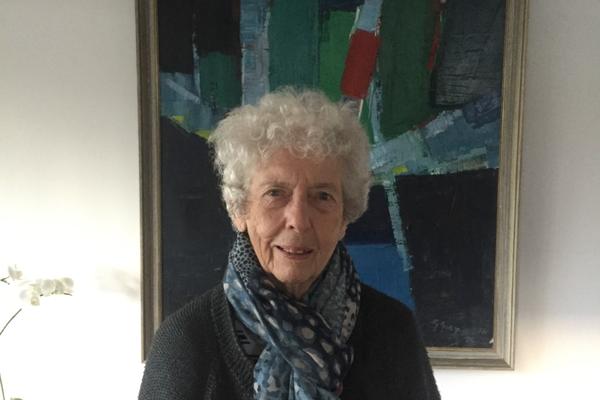
Carol Bolton: Clinical Psychologist and Psychotherapist

Michael Donkor: Novelist, Literary Critic, and Teacher

Nazia Du Bois: Global Marketing Leader

Ryan Wilson: Teacher, Journalist, Producer, and Author

James Kelly: Critical Care Doctor and Medical Educator

Sian Ejiwunmi-Le Berre: Actor, Screenwriter, Songwriter

Flo Graham-Dixon: Food Fanatic, Consultancy Co-founder

Anthony Good: Novelist and Software Developer
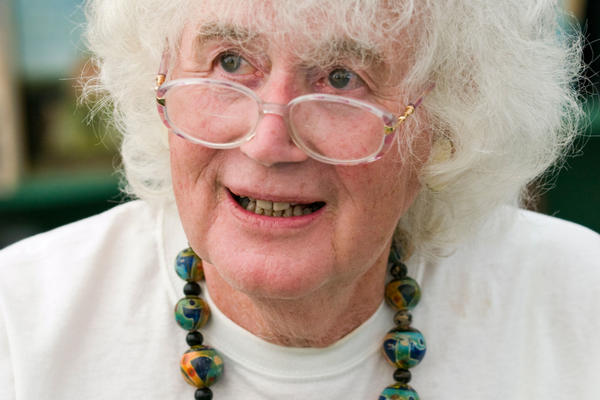
Jan Morris: Journalist, Historian, ‘Writer About Place’

Catherine Lynne Jenkins: Health Literacy Project Manager and PhD Researcher
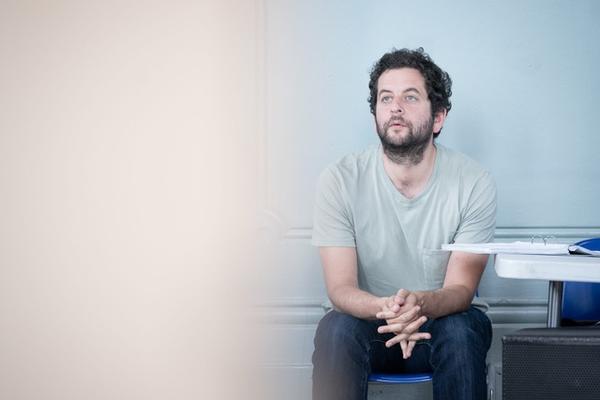
Bijan Sheibani: Playwright, Film and Theatre Director

Hannah Chukwu: Assistant Editor and Board Member
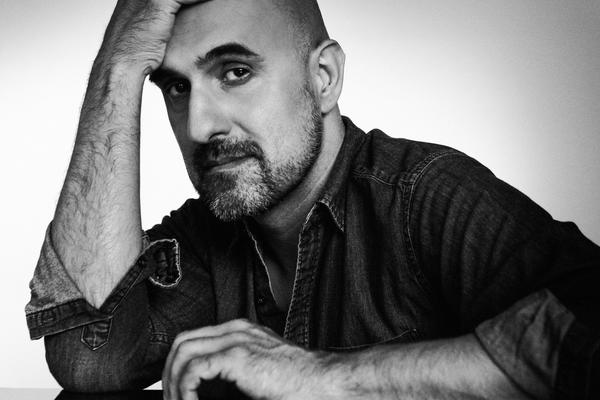
Hari Kunzru: Novelist and Journalist

Sam Gilbert: Entrepreneur, Researcher, Author

Dionne Farrell: Development Executive, Film
If you'd like to find out more about our almuni/ae and the paths they have taken after graduating from the Faculty of English, we'd recommend taking a look at the following pages:
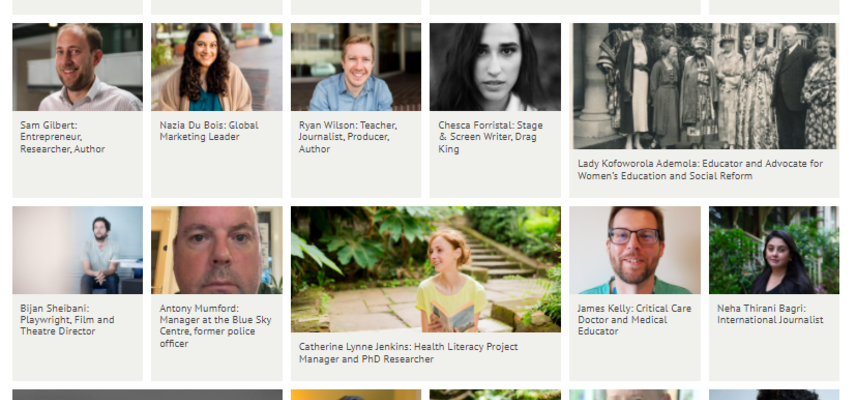
Telling Our Stories Better
The Telling Our Stories Better online gallery features interviews with a wide range of English alums who have gone on to careers in medicine and healthcare, law, business, tech, the arts, journalism, and more. The project aimed to challenge misconceptions about who studies English and the career paths they take.
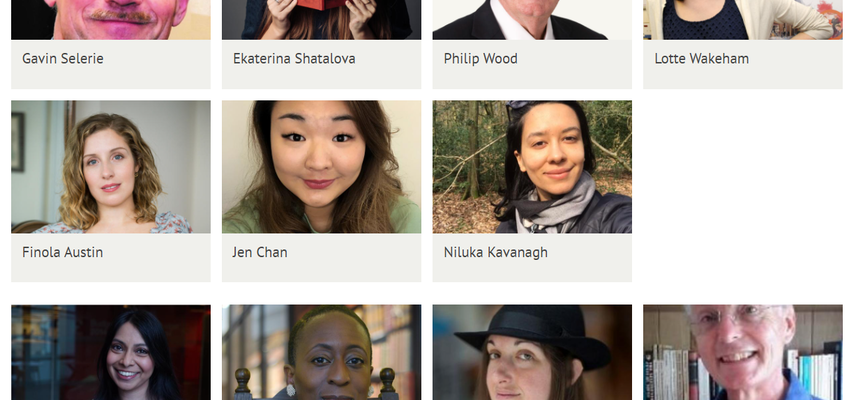
Meet our alumni
Some of our alumni have written short profiles to tell us more about their careers after graduating from the English Faculty and how their degree has helped them.
Admission support films
Virtual open day panel.
Taster lecture on Shakespeare with Prof Emma Smith
See all films on our YouTube channel >>
What can you do with an English literature degree?
Why study an english literature degree our essential guide to what you will learn on an english literature course, what you should study to get your place on a degree, and what jobs you can get once you graduate.
What can you do with an English literature degree?
A degree in English literature provides graduates with many transferable skills including communication, the ability to work analytically and complete research, and the skills to work independently. Although teaching is one of the most popular career routes with an English degree, there are actually many possibilities for work.
Some roles for English literature graduates include:
- Copywriter
- Journalist
- Content manager
- Book publishing
- Advertising
What is English literature?
The study of English literature focuses mainly on analysis, debate and critical theorising about a large number of published works, be they novels, poems, plays or other literary works.
Given this number of genres, it is perhaps unsurprising that a degree in English literature can be incredibly wide-ranging; two students on the same degree course can choose to study very different things outside of their core modules.
As well as analysis, students can also expect to have to defend their ideas, since it’s not enough to simply note something about a text, this must be accompanied by explanation and argument.
You can also expect to be taught aspects of creative writing and how to express ideas in various literary forms. It’s certainly a challenging course to take at university, but it can be immensely rewarding for those with a passion for English who are willing to work for it.
Explore the best universities for arts and humanities degrees
What do you learn on an english literature degree.
Most English literature degrees, will start off with a focus on classics and core texts from the country you are studying in.
More specifically, courses will often go through historical examples of landmark literature such as the works of Toni Morrison, William Shakespeare and Charles Dickens then perhaps introducing other lesser-known examples.
You may also be introduced to some foreign texts, although these will mainly be classics.
As the course continues you will be given more freedom to explore authors and genres that hold more interest for you.
In this way, an English literature degree can provide a great opportunity to test and refine your skills in a way that would be hard to do anywhere else, in addition to the opportunities presented by extra-curricular activities; most universities will have student publications you can get involved with.
English literature is also a good subject to study alongside may others such as languages, history, politics or even economics and maths.
What can you do with a languages degree? What can you do with an English language degree? What can you do with a psychology degree? What can you do with a politics degree? What can you do with a philosophy degree? What can you do with a theology degree?
What should I study at high school if I want to study English literature?
As with all degrees, different institutions will have different entry requirements and there is no set pre-requisite for studying English literature.
However there are a few subjects that would be useful to study at high school such as history, philosophy, which can be a great help when studying historical texts and placing them into a context.
In addition to academic qualifications, experience with literature-related activities outside the classroom can be of huge benefit, both in terms of your application and in furthering your enjoyment of the course.
Creative activities such as writing for a publication at school, staying well-read across different types of literature, or even writing your own blog can all prove useful before and during your degree.
Why study a PhD in English literature? Studying Hispanic literature in Spain A day in the life of a US university student How to set up a student publishing house So you want to be a writer? Top tips from those who know 17 books you should read before (or at) university – chosen by students
What do people who study English literature do after graduation?
An English literature degree can open a number of doors once you’ve graduated. Opportunities to delve deeper into your field with a postgraduate course or PhD are a good choice should you find a particular genre or style of literature that you are particularly passionate about.
In terms of job opportunities, media and publishing can be a good fit for an English literature graduate, as they offer a good way to apply your knowledge of the written language.
These skills will also serve you well in advertising and marketing. Teaching is another option; from primary education right up to tertiary, English as a subject is considered important at all stages.
Georgia Bevis studied BA English and drama at Royal Holloway University and explains that "through studying English literature, I was able to develop my hunger for learning and love of stories into a passion. Now I channel that passion into the learning of others and teaching a new generation a love of learning and of literature in both English and drama." She now works as head of creative arts at a high school in the UK.
The analytical skills associated with such a degree also apply well to things such as law, so many students undertake law conversion courses.
Generally speaking, English literature is a degree well respected by potential employers owing to the numerous transferable skills it demonstrates.
A strong degree from a good university is a fantastic asset to have in general, not only being a great thing for employers and job prospects but also allowing access to excellent postgraduate schemes or conversion courses.
Which famous people studied English literature?
A huge number of famous people have taken English literature at university, either as a direct precursor to their later career or as a stepping stone to some other unrelated industry.
In fact many people choose to take degrees in English literature when they already have successful careers, such is their value.
Some famous graduates include Private Eye editor Ian Hislop, actor and broadcaster Stephen Fry, actress Emma Watson, Green Party MP Caroline Lucas and film director Martin Scorsese.
You may also like

.css-185owts{overflow:hidden;max-height:54px;text-indent:0px;} Best universities for arts and humanities degrees 2024

Best universities in the UK for arts and humanities degrees 2024

Best universities in Canada for arts and humanities degrees 2024
Register free and enjoy extra benefits
Receive job alerts that match your preferences.
PhD jobs in Literature
Find PhD jobs in Literature here. To have new jobs sent to you the day they're posted, sign up for job alerts.
Three 2-year Postdoctoral Fellowships at the Zukunftskolleg
(Fulltime, E 13 TV-L)Reference No: 2024/114. The preferred start date is April 1st, 2025. Conditionally on the submission of an external grant, the position can be extended for an additional year. In principle, the position can be divided into two...
Vacancy for two doctoral researchers on literature education
For the Centre for Literature and Education of the Faculty of Literature at KU Leuven, we are looking for two doctoral fellows. You contribute to the work of the research team and the activities of...
Discover related jobs: PhD positions in Engineering
Ph.D. candidate for modelling & optimising highly efficient drive systems for E-vehicles based on GaN devices
Ph.D. candidate for modelling & optimising highly efficient drive systems for E-vehicles based on GaN devicesThe Laboratory for High Power Electronic Systems (HPE) at the Department of Information ...
PhD PROJECT IN ENDOTHELIAL CELL HETEROGENEITY DURING STROKE
A pre-doctoral position in the context of a KU Leuven competitive 4-year C1 funding project entitled ‘Is the cerebroprotective function of Prdm16 during ischemic stroke mediated by controlling the ...
Ph.D. candidate for designing, modelling & optimising charging systems for E-vehicles based on GaN devices
Ph.D. candidate for designing, modelling & optimising charging systems for E-vehicles based on GaN devicesThe Laboratory for High Power Electronic Systems (HPE) at the Department of Information Tec...
Discover related jobs: PhD positions in Computer Science

PhD Student
Last application date Aug 27, 2024 00:00Contract Limited durationDegree a master's degree in science or engineering, in the fields of chemistry, physics, physical chemistry, chemical physics, materials science, solid-state chemistry or related dis...
PhD Candidate for Computational Approaches for Studying Animal Behavior, Personality, and Emotions
About our Campus: Rehovot Campus (Rehovot) and Mt. Scopus Campus (Jerusalem). The position will be based across two campuses: The Robert H. Smith Faculty of Agriculture, Food and Environment on The Hebrew University’s beautiful Rehovot Campus. Reh...
PhD Student on the topic "Audiovisual perception, interaction and cognition in real-world and eXtended Reality Environments" (f/m/d)
In the Audiovisual Technology Group, Ilmenau Interactive Immersive Technologies Center (www.tu-ilmenau.de/i3tc) at the Technische Universität Ilmenau (Germany) is a vacancy for aPhD Student on the topic "Audiovisual perception, interaction and cog...
Discover related jobs: PhD positions in Physics
PhD student position: quantum sensing of biomolecules and their chemical stimuli.
For the prestigious PhD school of the Swiss Nanoscience Institute, we solicit applications for a paid 4-year PhD student position in the Biomolecular Nano-Dynamics group at the Dept. of Chemistry a...
Jobs by field
- Programming Languages 192
- Electrical Engineering 188
- Artificial Intelligence 169
- Machine Learning 163
- Materials Engineering 149
- Molecular Biology 146
- Computational Sciences 141
- Materials Chemistry 135
- Cell Biology 128
- Mechanical Engineering 123
Jobs by type
- Postdoc 346
- Assistant / Associate Professor 148
- Researcher 117
- Professor 102
- Engineer 77
- Research assistant 71
- Management / Leadership 60
- Lecturer / Senior Lecturer 57
Jobs by country
- Belgium 285
- Netherlands 195
- Morocco 131
- Germany 125
- Switzerland 106
- Luxembourg 80
Jobs by employer
- Mohammed VI Polytechnic Unive... 135
- KU Leuven 120
- University of Luxembourg 79
- Eindhoven University of Techn... 70
- Ghent University 51
- ETH Zürich 49
- Leiden University 44
- Silicon Austria Labs (SAL) 43
- University of Twente 34
Department of English and Related Literature
PhD in English and Related Literature
Work in an intellectually invigorating environment and be supported by supervisors who are experts in their field.
| Length | Start dates ( ) | |
|---|---|---|
| PhD | 3 years full-time Distance learning available
| January |
Be inspired to reach your research ambitions in an intellectual and supportive community at the forefront of English research.
Your research
The diversity of our staff’s research interests means that we are well-positioned to supervise research in any field of literature, from the Middle Ages to the present day, including literature in languages other than English, and literary works in translation.
We also have distinctive expertise in practice-led teaching and research, including archival work and printing. The PhD in English and Related Literature is available on a full-time or part-time basis.
Under the guidance of your supervisor, you'll complete a thesis of up to 80,000 words. A typical semester will involve a great deal of independent research, punctuated by meetings with your supervisor who will be able to suggest direction and address concerns throughout the writing process. You'll be encouraged to undertake periods of research at archives and potentially internationally, depending on your research thesis.
Throughout your degree, you'll have the opportunity to attend a wide range of research training sessions in order to learn archival and research skills, and a range of research seminars organised by the research schools, which bring speakers from around the world for research talks and networking. There is also internal funding available if you wish to propose research events and symposia/conferences.
[email protected] +44 (0) 1904 323366
Related links
- How to apply
- Research degree funding
- Accommodation
- International students
- Life at York
You also have the option of enrolling in a PhD in English by distance learning, where you will have the flexibility to work from anywhere in the world. You will attend the Research Training Programme online in your first year and have supervision and progression meetings online.
You must attend a five-day induction programme in York at the beginning of your first year. You will also visit York in your second and third years (every other year for part-time students).
Apply for PhD in English and Related Literature (distance learning)
Top ten department
We're a top ten research department according to the Times Higher Education’s ranking of the latest REF results (2021).
35th in the world
for English Language and Literature in the QS World University Rankings by Subject, 2023.
Athena Swan Bronze
We're proud to hold an Athena Swan Bronze award in recognition of the work we do to support gender equality in English.

Explore funding for postgraduate researchers in the Department of English and Related Literature.
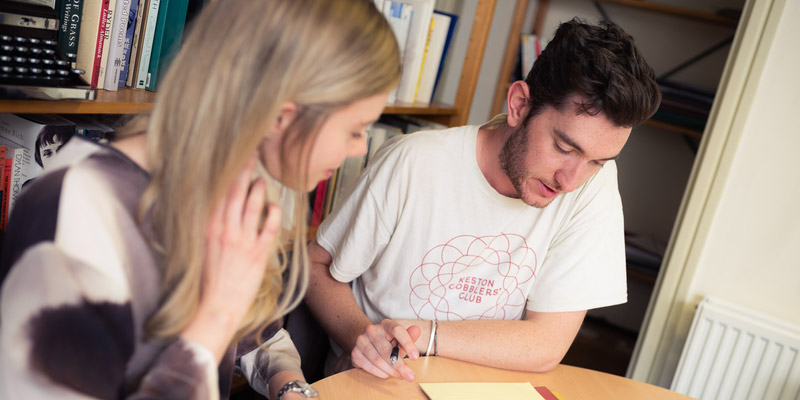
Supervision
Explore the expertise of our staff and identify a potential supervisor.
Research training
You'll receive training in research methods and skills appropriate to the stage you've reached and the nature of your work. In addition to regular supervisory meetings to discuss planning, researching and writing the thesis, we offer sessions on bibliographic and archival resources (digital, print and manuscript). You'll receive guidance in applying to and presenting at professional conferences, preparing and submitting material for publication and applying for jobs. We meet other training needs in handling research data, various modern languages, palaeography and bibliography. Classical and medieval Latin are also available.
We also offer training in teaching skills for students who wish to pursue teaching posts following their degree. This includes sessions on the delivery and content of seminars and workshops to undergraduates, a structured shadowing programme, teaching inductions and comprehensive guidance and resources for our graduate teaching assistants. Our teacher training is directed by a dedicated staff member.
You'll also benefit from the rich array of research and training sessions at the Humanities Research Centre .
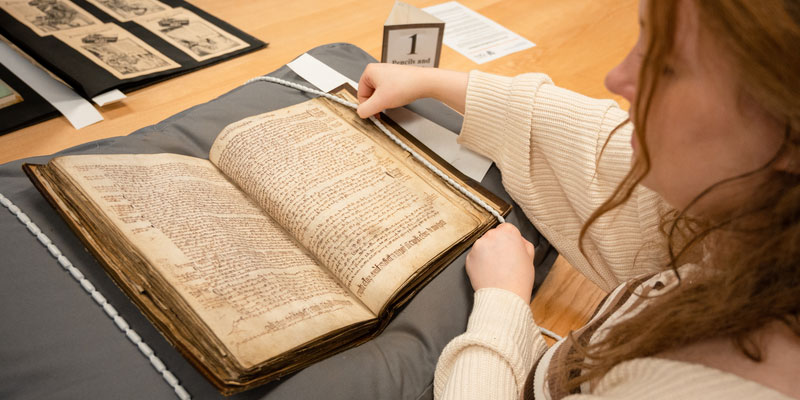
Course location
This course is run by the Department of English and Related Literature.
You'll be based on Campus West , though your research may take you further afield.
We also have a distance learning option available for this course.
Entry requirements
For doctoral research, applicants should hold or be predicted to achieve a first-class or high upper second-class undergraduate degree with honours (or equivalent international qualification) and a Masters degree with distinction.
The undergraduate and Masters degrees should be in literature, or in a related subject that is closely tied to the proposed research project.
Other relevant experience and expertise may also be considered:
- Evidence of training in research techniques may be an advantage.
- It is expected that postgraduate applicants would be familiar with the recent published work of their proposed supervisor.
- Publications are not required and we don't expect applicants to have been published before they start their research degrees.
Supervisors interview prospective research students to ensure good supervisory match and to help with funding applications.
The core deciding factor for admission is the quality of the research proposal, though your whole academic profile will be taken into account. We are committed to ensuring that no prospective or existing student is treated less favourably. See our admissions policy for more information.
Take a look at the supporting documents you may need for your application.
Before applying, we advise you to identify a potential supervisor in the department. Preliminary enquiries are welcomed and should be made as early as possible. Please email one member of staff at a time, after checking that their research expertise matches your project. Emailing several staff members at a time regardless of the relationship between their research interests and yours means that you are unlikely to find a good supervisory match.
If it's not clear which member of staff is appropriate, you should email the Graduate Chair .
Apply for the PhD in English and Related Literature
Students embarking on a PhD programme are initially enrolled provisionally for that qualification. Confirmation of PhD registration is dependent upon the submission of a satisfactory proposal that meets the standards required for the degree, usually in the second year of study.
Find out more about how to apply .
English language requirements
You'll need to provide evidence of your proficiency in English if it's not your first language.
Check your English language requirements
Research proposals
In order to apply for a PhD, we ask that you submit a research proposal as part of your application.
When making your application, you're advised to make your research proposals as specific and clear as possible. Please indicate the member(s) of staff that you'd wish to work with.
Your research proposal should:
- Identify the precise topic of your topic and communicate the main aim of your research.
- Provide a rigorous and thorough description of your proposed research, including the contributions you will make to current scholarly conversations and debates.
- Describe any previous work you have done in this area, with reference to relevant literature you have read so far.
- Communicate the central sources that the project will address and engage.
- Offer an outline of the argument’s main claims and contributions. Give a clear indication of the authors and texts that your project will address.
- Include the academic factors, such as university facilities, libraries resources, centres, other resources, and / or staff, which have specifically led you to apply to York.
What we look for:
- How you place your topic in conversation with the scholarly landscape: what has been accomplished and what you plan to achieve. This is your chance to show that you have a good understanding of the relevant work on your topic and that you have identified a new way or research question to approach the topic.
- Your voice as a scholar and critical thinker. In clean, clear prose, show those who will assess your application how your proposal demonstrates your original thinking and the potential of your research.
- Your fit with York, including the reasons for working with your supervisor and relevant research schools and centres.
- Above all, remember that there isn’t one uniform way to structure and arrange your research proposal, and that your approach will necessarily reflect your chosen topic.
Careers and skills
- You'll receive support in applying to and presenting at professional conferences, preparing and submitting material for publication and applying for jobs.
- You'll benefit from training in handling research data, various modern languages, palaeography and bibliography. Classical and medieval Latin are also available. The Humanities Research Centre also offers a rich array of valuable training sessions.
- We also offer training in teaching skills if you wish to pursue a teaching post following your degree. This includes sessions on the delivery and content of seminars and workshops to undergraduates, a structured shadowing programme, teaching inductions and comprehensive guidance and resources for our graduate teaching assistants.
- You'll have the opportunity to further your training by taking courses accredited by Advance HE: York Learning and Teaching Award (YLTA) and the York Professional and Academic Development scheme (YPAD) .
Find out more about careers
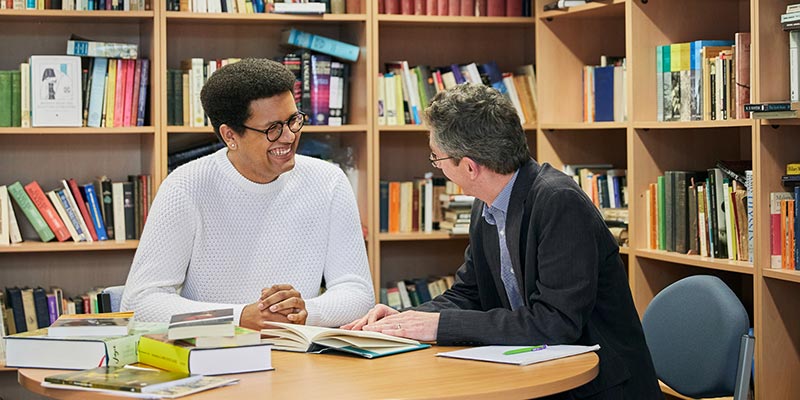
Discover York

We offer a range of campus accommodation to suit you and your budget, from economy to deluxe.

Discover more about our researchers, facilities and why York is the perfect choice for your research degree.

Graduate Research School
Connect with researchers across all disciplines to get the most out of your research project.
Find a supervisor
Explore our staff expertise
Find out all you need to know about applying to York
Find funding to support your studies
Educational resources and simple solutions for your research journey

Career Opportunities After PhD: Tips for a Successful Job Search
Table of Contents
Challenges with employment and career opportunities after PhD
The current academic job market has become increasingly competitive for PhD graduates, which has made it important for them to explore the available options and careers after PhD. PhD holders exceed the limited tenure positions and are often forced to move to non-academic positions or remain underemployed in career paths after PhD that often require lesser degrees. Graduates of some fields may better navigate non-academic labor markets than others. 1
For example, STEM, business, and economics graduates are more likely to obtain industry-specific technical and applied skills. But, others wondering how to get into industry after PhD may not recognize the extent to which their problem-solving, analytical, and critical-thinking skills may be used outside academia.
Non-academic careers after PhD are not simply a preference but have become a necessity for many PhD holders, especially when academic jobs are limited. It could also be related to your personal values, family situation, instability/insecurities in working on a contract, preferences or available career options after PhD. Doctoral students also perceive limited support and a lack of resources to address their diverse career development needs during their training as a reason for this shift. 2 Most often, PhD scholars don’t know how to get into industry after PhD as they feel they are misfits here. The extent of mismatch could be in terms of skills, the field of study, and over-qualification. This article can help you overcome some challenges in finding suitable career opportunities after PhD.
Career options after PhD
Most often, PhD scholars don’t know how to get into industry after PhD as they feel they are misfits here. The extent of mismatch could be in terms of skills, the field of study, and over-qualification. This article can help you overcome some challenges in finding suitable career opportunities after PhD.
The following are just some of the PhD career options you have upon achieving your doctorate:
In academia
- Adjunct faculty position
In industry
- Policymakers/Adviser to policymakers
- Entrepreneur
- Public speaker
Optimizing your job search for great careers after PhD
As a PhD student, you might find it hard to decide the next step in your career after PhD. Not everyone completing a PhD will find full-time tenure positions at higher education institutions. You would naturally want a lucrative and rewarding career after PhD that makes all the hardships worthwhile. But choosing between academic/non-academic jobs or private/public sector jobs can be challenging, especially if you are unfamiliar with the job-hunting game inside/outside of academia. The following steps can help you with your job search process and steer your career path after PhD.
- Reflect : Look back on your experiences to identify what aspects of your research you enjoyed most. It could be experimental or fieldwork, creative writing, connecting with other researchers or managing your project. There are many career options for PhD holders in the market and some reflection will help you identify the direction in which you want to go.
- Decide location : Your preferred location can influence your job search. Think about where you’d like to live and the job opportunities and career options for PhD holders available there. Often, you might find that you want to go back to your home country to pursue a career after PhD and would have to adjust your job search depending on the type of jobs available locally. Therefore, looking for the right job in the right place can reduce your search time.
- Network : Many PhDs underestimate the importance of networking effectively and having a good communication strategy in determining their careers after PhD. Jobs received through university networks tend to align with your education and offer better career opportunities after PhD. 3 So find some time to attend events and network with stakeholders in top companies and other universities. Speaking to senior colleagues about your job search can also help you understand their experiences and learn how to get into industry after PhD. Finally, make sure to have a LinkedIn profile to connect with people having similar interests and careers after PhD.
- Career centers : Your university career center can also offer guidance on possible careers after PhD, especially finding a good position upon graduating. They can also help you familiarize yourself with institutions that award research grants and their requirements.
- Websites : You may find career opportunities for PhDs on university websites or other relevant platforms, such as:
-Nature careers
-New scientist jobs
-Science Careers
-Technojobs-PhD jobs
- Strong resume : When applying for non-academic jobs, focus on enhancing the many transferable skills from your PhD, such as:
-Communication skills – your work with presentations, lectures, or seminars
-Creative thinking – good at outside-the-box thinking
-Management – great with time, workloads, mentoring undergraduate students
-Problem-solving skills – mention the many research problems solved
Use the following strategies to enhance the quality of your CV or resume for better
- Highlight achievements: Your CV should include sufficient detail to show a selection committee that you are the perfect candidate for the job. Update your CV regularly to include recent achievements and skills gained that are relevant in careers after PhD.
- Tailor-made for the job: Fine-tune your CV to meet the job requirements. An academic CV should be different from a non-academic one to match the needs of that particular opportunity. A 1-2 page summary of your experiences and expertise is sufficient for an industry job, but your academic CV should include a full record of your work and can be much longer.
- Add specific, credible information: To secure the best career after PhD, ensure the CV you submit is supported by sufficient details of specific experiences that highlight your efforts and skills.
- Add evidence: Incorporate quantitative evidence or proof to support the facts in your CV. Do not fabricate information that will crumble under scrutiny and mar your career options after PhD.
- Start early and keep looking: Finally, start your job search early and keep looking until you have found a job that meets your requirements.
You can pursue a variety of careers after PhD, and we hope the points above help you find the best career opportunities after your PhD is over. Best of luck with your applications!
Related Posts

What are the Best Research Funding Sources

Inductive vs. Deductive Research Approach
We use cookies to help our site work, to understand how it is used, and to tailor ads that are more relevant to you and your interests.
By accepting, you agree to cookies being stored on your device. You can view details and manage settings at any time on our cookies policy page.

PhD English Literature
We perform innovative and world-leading research across literature, writing and linguistics. Our diverse mix of subject specialities means we are a vibrant and imaginative community with lots of opportunity for intellectual exchange.
Key course information
October 2024 - full-time, october 2024 - part-time, january 2025 - full-time, january 2025 - part-time, april 2025 - full-time, april 2025 - part-time, july 2025 - full-time, july 2025 - part-time, why choose this programme.
- Our research-active staff are at the forefront of knowledge in English literature, creative writing, film studies, translation studies, theoretical and applied linguistics, and literary and cultural studies.
- Our research concentrates on a range of periods, themes and subjects, spanning Medieval literature, Shakespeare and the Renaissance, Romanticism, Victorian and 19th-century literature, Modern and contemporary literature, creative writing and film studies.
- We’re part of TECHNE , an Arts and Humanities Research Council (AHRC)-funded doctoral training partnership, which provides access to comprehensive academic and professional training programmes, as well as the possibility of funding for your studies.
- The Research Excellence Framework (REF) 2021 ranked Literature and Languages 10th for research impact in the UK, with 75% of our case studies rated as having outstanding impacts, in terms of reach and significance (4*). Our submission to REF included contributions from the Guildford School of Acting (GSA).
Fantastic graduate prospects
95% of Surrey's postgraduates go on to employment or further study
10th for Research impact
The Research Excellence Framework (REF) 2021 ranked Literature and Languages
Programme details Open
What you will study.
Our English Literature PhD will train you in critical and analytical skills, research methods, and knowledge that will equip you for your professional or academic career. It normally takes around three or four years to complete our full-time PhD.
You’ll be assigned a primary and secondary supervisor, who will meet with you regularly to read and discuss your work and progress. For us, writing is essential for understanding and developing new perspectives, so you’ll be submitting written work right from the start of your course.
In the first year of your PhD, you’ll refine your research proposal and plan the structure of your work with the guidance and support of your supervisors. As you go into your second and third year, you’ll gradually learn to work more independently, and your supervisors will guide you on how to present at conferences and get your work published.
After 12-15 months, you’ll submit a substantial piece of work for a confirmation examination. The confirmation examination will be conducted by two internal members of staff not on your supervisory team and will give you the opportunity to gain additional guidance on your research-to-date. The final two years of your PhD will be devoted to expanding and refining your work ready for submission of the final thesis.
As a doctoral student, you’ll receive a structured training programme covering the practical aspects of being a researcher, including grant-writing, publishing in journals, and applying for academic jobs.
Your final assessment will be based on the presentation of your research in a written thesis, which will be discussed in a viva examination with at least two examiners. You have the option of preparing your thesis as a monograph (one large volume in chapter form) or in publication format (including chapters written for publication), subject to the approval of your supervisors.
Stag Hill is the University's main campus and where the majority of our courses are taught.
Research areas Open
Research themes.
- Women's writing (especially medieval women's writing, early modern women's drama and Victorian women writers)
- Medieval romance
- Romanticism
- Victorian studies
- Modernism and modernity
- Travel and mobility
- Western and global esotericisms
- Sexuality and queer theory
- Postmodern and post-postmodern writing
- Contemporary fiction
- Transnational literature.
Discover more about our literature and languages research .
Academic staff Open
See a full list of all our literature and languages academic staff .
Support and facilities Open
Research support.
In addition to a number of excellent training opportunities offered by the University, our PhD students can take additional subject-specific training and take part in research seminars and events. These provide a valuable opportunity to meet visiting scholars whose work connects with our own research strengths across literature, theory, and creative writing.
The professional development of postgraduate researchers is supported by the Doctoral College , which provides training in essential skills through its Researcher Development Programme of workshops, mentoring and coaching. A dedicated postgraduate careers and employability team will help you prepare for a successful career after the completion of your PhD.
You’ll be allocated shared office space and have full access to our library and online resources. Our close proximity to London also means that the British Library and many other important archives are within easy reach.
Hear from our students Open

Edwin Gilson
Student - English Literature PhD
"A real highlight for me was having an article published in a well-known journal in my field. This came out of a chapter I wasn’t expecting to write at the start of the thesis, on a novel I read during the PhD."
Entry requirements Open
Uk qualifications.
Applicants are expected to hold a good first-class UK degree (a minimum 2:1 or equivalent) and an MA in a relevant topic.
English language requirements
IELTS Academic: 7.0 or above with a minimum of 6.5 in each component (or equivalent).
These are the English language qualifications and levels that we can accept.
If you do not currently meet the level required for your programme, we offer intensive pre-sessional English language courses , designed to take you to the level of English ability and skill required for your studies here.
Selection process
Selection is based on applicants:
- Meeting the expected entry requirements
- Being shortlisted through the application screening process
- Completing a successful interview
- Providing suitable references.
Fees and funding Open
Fees per year.
Explore UKCISA’s website for more information if you are unsure whether you are a UK or overseas student. View the list of fees for all postgraduate research courses.
- Annual fees will increase by 4% for each year of study, rounded up to the nearest £100 (subject to legal requirements).
- Any start date other than September will attract a pro-rata fee for that year of entry (75 per cent for January, 50 per cent for April and 25 per cent for July).
Additional costs
There are additional costs that you can expect to incur when studying at Surrey.
A Postgraduate Doctoral Loan can help with course fees and living costs while you study a postgraduate doctoral course.
Application process
Applicants are advised to contact potential supervisors before they submit an application via the website. Please refer to section two of our application guidance .
After registration
Students are initially registered for a PhD with probationary status and, subject to satisfactory progress, subsequently confirmed as having PhD status.
Apply online
To apply online first select the course you'd like to apply for then log in.
Select your course
Choose the course option you wish to apply for.
Create an account and sign into our application portal.
English Literature PhD
Full-time, October 2024
Part-time, October 2024
Full-time, January 2025
Part-time, January 2025
Full-time, April 2025
Part-time, April 2025
Full-time, July 2025
Part-time, July 2025
About the University of Surrey

Accommodation
We have a range of housing to suit all requirements and budgets. There are more than 6,000 rooms available (en-suite, single-sex, studio flat, shared or single).

Student life
At Surrey we offer a friendly university campus set in beautiful countryside, with the convenience and social life of bustling Guildford on your doorstep.
Need more information?
Contact our Admissions team or talk to a current University of Surrey student online.
Code of practice for research degrees
Surrey’s postgraduate research code of practice sets out the University's policy and procedural framework relating to research degrees. The code defines a set of standard procedures and specific responsibilities covering the academic supervision, administration and assessment of research degrees for all faculties within the University.
Download the code of practice for research degrees (PDF) .
Terms and conditions
When you accept an offer to study at the University of Surrey, you are agreeing to follow our policies and procedures , student regulations , and terms and conditions .
We provide these terms and conditions in two stages:
- First when we make an offer.
- Second when students accept their offer and register to study with us (registration terms and conditions will vary depending on your course and academic year).
View our generic registration terms and conditions (PDF) for the 2023/24 academic year, as a guide on what to expect.
This online prospectus has been published in advance of the academic year to which it applies.
Whilst we have done everything possible to ensure this information is accurate, some changes may happen between publishing and the start of the course.
It is important to check this website for any updates before you apply for a course with us. Read our full disclaimer .
Please start typing and select a location from the list
Languages, Literature & Culture PhDs
Hide introduction
View introduction
Discover the latest academic modern languages and language-related roles at jobs.ac.uk's Languages, Literature, and Culture job page. We offer a wide range of opportunities in the UK and overseas, from teaching to research and postgraduate roles. Browse our selection of vacancies and sign up for our jobs by email service to stay up-to-date with the latest opportunities.
4 PhDs Found
Agriculture, Food & Veterinary 3
Agriculture 3
Food Science 1
Veterinary Science 1
Architecture, Building & Planning 13
Architecture & Building 13
Urban & Rural Planning 1
Biological Sciences 39
Biochemistry 14
Microbiology 9
Molecular Biology & Biophysics 13
Other Biological Sciences 21
Business & Management Studies 6
Accountancy & Finance 3
Business Studies 5
Hospitality & Leisure 2
Human Resources Management 2
Management 5
Marketing 2
Other Business & Management Studies 2
Real Estate Management 2
Computer Sciences 139
Artificial Intelligence 82
Computer Science 119
Cyber Security 12
Information Systems 49
Software Engineering 42
Creative Arts & Design 7
Other Creative Arts 5
Performing Arts 2
Economics 4
Education Studies (inc. TEFL) 0
Education Studies 0
Research Methods 0
Teacher Training 0
TEFL/TESOL 0
Engineering & Technology 290
Aerospace Engineering 44
Biotechnology 21
Chemical Engineering 51
Civil Engineering 48
Electrical & Electronic Engineering 139
Maritime Technology 22
Mechanical Engineering 100
Metallurgy & Minerals Technology 23
Other Engineering 152
Production Engineering & Manufacturing 40
Health & Medical 51
Anatomy, Physiology & Pathology 14
Medical Technology 17
Medicine & Dentistry 43
Nutrition 1
Pharmacology, Toxicology & Pharmacy 8
Historical & Philosophical Studies 7
Archaeology 1
History of Art 4
Philosophy 1
Theology & Religious Studies 2
Information Management & Librarianship 4
Curatorial Studies 1
Information Science 3
Librarianship 0
Other Information Management & Librarianship 1
Languages, Literature & Culture 4
Cultural Studies 3
Languages 2
Linguistics 1
Literature 4
Mathematics & Statistics 44
Mathematics 41
Statistics 12
Media & Communications 2
Communication Studies 1
Journalism 1
Media Studies 1
Publishing 0
Physical & Environmental Sciences 232
Chemistry 67
Environmental Sciences 34
Geography 7
Materials Science 129
Ocean Sciences 7
Other Physical Sciences 99
Physics & Astronomy 154
Politics & Government 4
Psychology 21
Social Sciences & Social Care 19
Anthropology 2
Human & Social Geography 3
Other Social Sciences 7
Social Policy 6
Social Work 5
Sociology 12
Sport & Leisure 3
Sports & Leisure Management 0
Sports Coaching 0
Sports Science 3
Administrative 0
Estates & Facilities Management 0
Finance & Procurement 0
Fundraising, Alumni, Bids & Grants 0
Health, Wellbeing & Care 0
Hospitality, Retail, Conferences & Events 0
Human Resources 0
International Activities 0
IT Services 0
Laboratory, Clinical & Technician 0
Legal, Compliance & Policy 0
Library Services, Data & Information Management 0
PR, Marketing, Sales & Communication 0
Project Management & Consulting 0
Senior Management 0
Sports & Leisure 0
Student Services 0
Sustainability 0
Web Design & Development 0
Integrated Masters / Doctorate 0
International Doctorate 0
Professional Doctorate 0
EU Students 3
International Students 3
Self-funded Students 0
UK Students 4
United Kingdom 4
Greater London 3
Leicestershire 1
Loughborough 1
Guildford 1
Tyne and Wear 1
Newcastle upon Tyne 1
Up to £9,999 0
£10,000 - £14,999 0
£15,000 - £19,999 1
£20,000 - £24,999 0
£25,000 - £29,999 0
£30,000 - £39,999 0
£40,000 - £49,999 0
£50,000 - £59,999 0
£60,000 - £69,999 0
£70,000 - £79,999 0
£80,000 - £89.999 0
£90,000 - £99,999 0
Over £100,000 0
Full Time 4
Part Time 0
Permanent 0
Fixed-Term/Contract 4
Commercial Organisations 0
European Universities and Colleges 0
North American Universities and Colleges 0
Other Public Sector 0
Public Sector - Education 0
Research and Other Institutes 0
UK and Irish HE Institutions 4
UK FE Colleges 0
- Date Placed
- Closing Date
At jobs.ac.uk's Languages, Literature, and Culture job page, discover the latest academic modern languages jobs and other language-related roles, such as Linguistics, English Language, Classics, Literature, ESOL, ESL, and EFL jobs. Our job search platform offers a wide range of opportunities in the UK and overseas, from lecturer and professor positions to research and postgraduate roles. Whether you're looking to develop your career in teaching or research, we have something for everyone. Browse our selection of language-related vacancies today and take the next step in your academic career. Don't forget to sign up for our jobs by email service to stay up-to-date with the latest opportunities.
4 Languages, Literature & Culture PhDs Found
Phd alert created, job alert created.
Your PhD alert has been successfully created for this search.
Your job alert has been successfully created for this search.
Account Verification Missing
In order to create multiple job alerts, you must first verify your email address to complete your account creation
jobs.ac.uk Account Required
In order to create multiple alerts, you must create a jobs.ac.uk jobseeker account
Alert Creation Failed
Unfortunately, your account is currently blocked. Please login to unblock your account.
Email Address Blocked
We received a delivery failure message when attempting to send you an email and therefore your email address has been blocked. You will not receive job alerts until your email address is unblocked. To do so, please choose from one of the two options below.
Max Alerts Reached
A maximum of 5 Job Alerts can be created against your account. Please remove an existing alert in order to create this new Job Alert
Creation Failed
Unfortunately, your alert was not created at this time. Please try again.
Create PhD Alert
Create job alert.
When you create this PhD alert we will email you a selection of PhDs matching your criteria. When you create this job alert we will email you a selection of jobs matching your criteria. Our Terms and Conditions and Privacy Policy apply to this service. Any personal data you provide in setting up this alert is processed in accordance with our Privacy Notice
Max Saved Jobs Reached
A maximum of 500 Saved Jobs can be created against your account. Please remove an existing Saved Job in order to add a new Saved Job.
Please sign in or register for an account to save a job.
jobs.ac.uk Career Advice section can help get your Languages, Literature & Culture job search off to a strong start. The Career Advice section can help you discover a wide range of tools and resources designed to assist you in creating impactful CVs and cover letters, preparing for interviews, and confidently navigating the job application process.
Gain essential tips on formatting, content, and presentation that are crucial for job applications. Whether you're a recent graduate or an experienced professional, our guides will help you effectively highlight your skills and experience.
Never miss out on the perfect Languages, Literature & Culture job opportunity by signing up for our jobs by email service .Stay informed and receive updates directly in your inbox, ensuring you never miss a chance to advance your career.
Targeted PhDs

Copyright © jobs.ac.uk 1998 - 2024
- Career Advice
- Jobs by Email
- Advertise a Job
- Terms of use
- Privacy Policy
- Cookie Policy
- Accessibility Statement
Browser Upgrade Recommended
For the best user experience, we recommend viewing jobs.ac.uk on one of the following:

English Language and Literature MPhil/PhD
London, Bloomsbury
One of the highest-ranking English departments in the UK ( The Guardian University Guide 2023 - English ), UCL English provides excellent opportunities for PhD students to study in the heart of literary London, with access to vast quantities of resources and research materials, and a high number of academic staff working on a diverse range of specialist research topics.
UK tuition fees (2024/25)
Overseas tuition fees (2024/25), programme starts, applications accepted.
- Entry requirements
An undergraduate degree in English Literature or a related subject is a pre-requisite for this programme, and a UK Master's degree in a relevant discipline, or an overseas qualification of an equivalent standard will normally be required. Research degree students are expected to start in September, but may request to start in January if there are exceptional reasons to do so. Applicants who wish to be considered for AHRC/ LAHP funding must have submitted a complete application by 5 January 2024.
The English language level for this programme is: Level 2
UCL Pre-Master's and Pre-sessional English courses are for international students who are aiming to study for a postgraduate degree at UCL. The courses will develop your academic English and academic skills required to succeed at postgraduate level.
Further information can be found on our English language requirements page.
Equivalent qualifications
Country-specific information, including details of when UCL representatives are visiting your part of the world, can be obtained from the International Students website .
International applicants can find out the equivalent qualification for their country by selecting from the list below. Please note that the equivalency will correspond to the broad UK degree classification stated on this page (e.g. upper second-class). Where a specific overall percentage is required in the UK qualification, the international equivalency will be higher than that stated below. Please contact Graduate Admissions should you require further advice.
About this degree
With access to vast collections of research materials and supervision from world-leading experts* in a wide range of literary periods and topics, UCL provides an exceptionally strong environment in which to study for an English PhD. UCL English Department has specialists in every period of English and American literature, as well as English language, with an outstanding record of internationally recognised scholarship and publications. A PhD in English at UCL will allow you to pursue original research and make a significant contribution to your field.
Students accepted for admission are given a principal supervisor with whom they will work closely during the course of the degree. A subsidiary supervisor is also appointed to provide additional advice. Great importance is attached to matching student and supervisor, and ensuring that students' progress is well monitored. Students meet either one or other supervisor approximately ten times during the academic year.
Graduate students initially register for the MPhil degree, but usually upgrade to full PhD student status in the second year, if progress is satisfactory. (The English Department does not offer a standalone research Master's programme, nor is it possible to be admitted as a PhD student directly.) In addition to the upgrade review in the second year, progress is also reviewed at the end of each year. Students who are making good progress will usually be offered opportunities to gain teaching experience from the second year onwards.
There are normally about 45 students undertaking research degrees in the department. They form a diverse, friendly, and vibrant intellectual community. There is a full programme of departmental research seminars at which papers are given by invited speakers and graduate students, and students also have access to a wide range of seminars and research events across UCL and the University of London. Research skills training is provided both within and beyond the department.
PhD students at UCL have access to an incomparable range of libraries, including the British Library and Senate House Library (the library of the University of London). They can also apply to spend a period as a visiting scholar at Yale as part of the UCL-Yale Collaborative Partnership.
Who this course is for
This programme is suitable for applicants with a strong interest or background in a wide range of literary periods or in English Linguistics, and who want to do complete research alongside specialists in literature in English and linguistics of the English language. The programme is suitable for both recent Masters graduates as well as early or mid-career professionals who have achieved the stated entry requirements.
What this course will give you
As one of the most respected academic institutions in the world ( QS World University Rankings 2023 ), UCL is an excellent place to study for a PhD in English. Our PhD students benefit from specialist supervision by world-leading researchers* as well as access to the outstanding range of research resources available to them in London.
The clear structure of the PhD programme, with regular progress reviews, supports successful completion, while the training courses offered by the department and UCL enable the development of both specific research skills and the professional skills needed for an academic career.
The relatively small department also offers many opportunities for formal and informal intellectual exchanges and collaborations, supported by our programme of research seminars. Many of our students also make the most of UCL’s partnership with Yale to spend a period of study there.
PhD students in English at UCL acquire advanced skills of the highest calibre as researchers, writers, and presenters of their work. They will also usually gain experience of teaching (both tutorials and seminars).
*UCL English has an outstanding research record, with 94% of our research outputs being graded as 4* 'world leading' or 3* 'internationally excellent' in the REF 2021.
The foundation of your career
The English Department is proud of its PhD alumni and values its ongoing relationship with them. We welcome alumni to departmental events, and encourage them to keep in touch with us at [email protected] . For more information on UCL’s wider alumni community, please see our website .
Employability
Our PhD graduates have an excellent record of securing employment in institutions of higher education and have progressed to academic positions here at UCL, at Oxford and Cambridge, in the wider University of London, at other universities across the UK, and in international destinations including the United States, Canada, and New Zealand. They are also well placed to pursue careers outside academia, as the skills in research, analysis, writing, and communication obtained during the PhD transfer easily to high-level work in many sectors.
Networking both among students and with academic staff and visiting speakers is facilitated by our lively programme of departmental research seminars, as well as our various reading groups and events. Beyond the department, extensive opportunities to meet fellow specialists and exchange knowledge and ideas are offered by the events programmes of the UCL Institute for Advanced Studies, the University of London Institute of English Studies, and numerous other research institutions near UCL and across London.
Teaching and learning
The MPhil/PhD degree programme primarily consists of independent research and self-directed study, and the central work of defining a thesis topic, and planning the stages of research and writing, is undertaken in close consultation with the primary supervisor. You will also undertake skills training that may take the form of seminars, workshops, and conferences.
Graduate students initially register for the MPhil degree, but upgrade to full PhD student status at the start of the second year, if progress is satisfactory.
In addition to the upgrade review at the start of the second year, progress is also reviewed at the end of the first year, in the first-year review, where the student submits a portfolio to their supervisory team, and at the Higher Degrees Sub Committee (HDSC) in their third year, where a submitted portfolio is assessed by a panel of senior academics in the department. A successful performance at the HDSC normally means the student will achieve Completing Research Student (CRS) status. Students who are making good progress will usually be offered opportunities to gain teaching experience from the second year onwards.
The MPhil/PhD degree programme consists of independent research and self-directed study. There are no set contact hours for the programme, but it is expected that your hours of study will mirror that of staff engagement as closely as possible (and this should be pro-rata for part-time study). If you have external funding, you should also ensure that you meet the Terms & Conditions of your funder in this regard. You will typically meet with your supervisory team up to ten times per academic year, and you will also undertake skills training that may take the form of seminars, workshops, and conferences.
Research areas and structure
We offer expertise in a wide range of topics within the field of English literature and language. Some areas in which the department would particularly welcome applications are:
- Old and Middle English literature and manuscript studies
- Relations between English and insular and continental French writings from the thirteenth to the fifteenth centuries
- Post-medieval bibliography and palaeography
- History of the book, textual and editorial theory and practice in all periods
- Shakespeare studies, including Shakespeare’s London
- The literature of the Elizabethan court
- Women writers of the sixteenth and seventeenth centuries
- Classicism in seventeenth and eighteenth-century literary culture
- Literature and science in the seventeenth and eighteenth centuries
- Revolutionary Writings in the Romantic period
- Homosexuality and literary history
- Literature and technology in late nineteenth and early twentieth-century literature
- Victorian and Edwardian writings on sexuality and adolescence
- Contemporary poetry
- Postmodern fiction
- London in literature/urban literature
- English grammar
- English language
- The history of the English language
- Corpus linguistics
You can read about our staff research interests on our website .
Research environment
UCL English has, throughout its history, been a pioneer in the study of English language and English literature, from Old English to contemporary texts. The department comprises a dynamic community of scholars with a breadth of expertise across literary periods and topics, as well as in language and linguistics. The comparatively small size of the department creates a friendly, inclusive research environment, with close contact between staff and students and many opportunities for intellectual exchange and collaboration.
Members of the English department have expertise in a wide range of approaches to English literature and language. Many of our literary research activities are organised around the key themes of The City, Editions, and Intercultural Exchanges, while our research in English Language is co-ordinated by the renowned Survey of English Usage. The department hosts regular research seminars at which PhD students, members of staff, and visiting speakers present their work; these include a themed strand of seminars on Race, Power, and Poetics. There are also many more seminars, reading groups and research events, both within the department, at the UCL Institute of Advanced Studies, and at the University of London’s Institute of English Studies. The department’s PhD students organise an annual Graduate Conference, where UCL speakers are joined by others from across the UK and beyond to share their research. They also publish Moveable Type, a peer-reviewed journal of academic articles, poetry and prose fiction.
UCL Library has outstanding physical and digital collections for literary research, as well as specialist materials in its excellent Special Collections department. Among these are the George Orwell Archive; Little Magazines; the Routledge and Kegan Paul Archives (publishing history); the Brougham Papers and papers of the Society for the Diffusion of Useful Knowledge (19th-century liberalism); and the Chadwick Papers (19th-century sanitary reform). UCL Library also has superb holdings in London history. We enjoy unrivalled proximity to the British Library, with its vast collections, and Senate House Library (the library of the University of London), as well as other rich research resources including the Institute of Historical Research, the Warburg Institute, and the Wellcome Collection.
The period of registration for the MPhil/PhD degree programme is 3 years for full-time study. You are required to register initially for the MPhil degree with the expectation of transfer to PhD after successful completion of an upgrade review 9-18 months after initial registration.
Throughout your period of registration, you will meet regularly with your supervisory team, receiving feedback on work-in-progress. Regular completion of an online research log will help you and your supervisors to assess your specific training needs. The English Department provides a course in PhD Skills Training; many further training opportunities are also offered by the UCL Doctoral Skills Development Programme and LAHP (the London Arts and Humanities Partnership).
To ensure timely and successful completion of the thesis, the English Department formally reviews each student’s progress at regular intervals (usually the end of each year) by requiring submission of a dossier of work which is discussed in an interview. The most important of these reviews falls during your second year (9-18 months from registration) and will assess your readiness to transfer from MPhil to full PhD student status.
Upon successful completion of your approved period of registration, you may apply for a further period of 1 year as a Completing Research Student (CRS) to prepare your thesis for submission. The final degree assessment takes the form of an oral examination based on the thesis and is conducted by two examiners, usually one internal and one external.
The period of registration for the MPhil/PhD degree programme is 5 years for part-time study. You are required to register initially for the MPhil degree with the expectation of transfer to PhD after successful completion of an upgrade review 15-30 months after initial registration for part-time study. Throughout your period of registration, you will meet regularly with your supervisory team, receiving feedback on work-in-progress. Regular completion of an online research log will help you and your supervisors to assess your specific training needs. The English Department provides a course in PhD Skills Training; many further training opportunities are also offered by the UCL Doctoral Skills Development Programme and LAHP (the London Arts and Humanities Partnership). To ensure timely and successful completion of the thesis, the English Department formally reviews each student’s progress at regular intervals (usually the end of each year) by requiring submission of a dossier of work which is discussed in an interview. The most important of these reviews falls during your second or third year (15-30 months from registration) for part-time study, and will assess your readiness to transfer from MPhil to full PhD student status. Upon successful completion of your approved period of registration, you may apply for a further period of 2 years (for part-time students) as a Completing Research Student (CRS) to prepare your thesis for submission. The final degree assessment takes the form of an oral examination based on the thesis and is conducted by two examiners, usually one internal and one external.
Accessibility
Details of the accessibility of UCL buildings can be obtained from AccessAble accessable.co.uk . Further information can also be obtained from the UCL Student Support and Wellbeing team .
Fees and funding
Fees for this course.
| Fee description | Full-time | Part-time |
|---|---|---|
| Tuition fees (2024/25) | £6,035 | £3,015 |
| Tuition fees (2024/25) | £28,100 | £14,050 |
The tuition fees shown are for the year indicated above. Fees for subsequent years may increase or otherwise vary. Where the programme is offered on a flexible/modular basis, fees are charged pro-rata to the appropriate full-time Master's fee taken in an academic session. Further information on fee status, fee increases and the fee schedule can be viewed on the UCL Students website: ucl.ac.uk/students/fees .
Additional costs
Additional costs may include expenses such as books, stationery, printing or photocopying, and conference registration fees.
The Department has some funds which can be applied for, to help offset the cost of travel to conferences or archives in the UK or overseas.
For more information on additional costs for prospective students please go to our estimated cost of essential expenditure at Accommodation and living costs .
Funding your studies
AHRC grants are available for UK/EU English PhD applicants who are applying to start a research degree in 2024. Applications are made directly to the London Arts and Humanities Partnership, who administer the awarding of AHRC funding at UCL. AHRC funding covers all fees, as well as providing a stipend for living expenses, for three years. If you have any questions about the application process please contact [email protected] .
UCL's Research Excellence Scholarships are available for UK/EU/Overseas applicants starting in 2024 and provides full funding including a stipend for living allowance for the length of the programme.
For a comprehensive list of the funding opportunities available at UCL, including funding relevant to your nationality, please visit the Scholarships and Funding website .
Quirk PhD Scholarship
Deadline: 26 January 2024 Value: Fees and maintenance (3yrs) Criteria Based on both academic merit and financial need Eligibility: UK
We recommend that applicants look at our list of staff on the UCL English website before submitting an application. Whilst potential supervisors are unable to accept a PhD student without a formal application form, we attach great importance to the match between supervisors and students, so please check that we have a member of teaching staff who could potentially supervise your project before applying. Applicants who are interested in applying for AHRC funding via the London Arts and Humanities Partnership (LAHP) must submit completed applications (including references) by 5 January 2024 (you will also need to complete a LAHP application form: see the LAHP website for details).
Please note that you may submit applications for a maximum of two graduate programmes (or one application for the Law LLM) in any application cycle.
Choose your programme
Please read the Application Guidance before proceeding with your application.
Year of entry: 2024-2025
Got questions get in touch.

English Language and Literature
UCL is regulated by the Office for Students .
Prospective Students Graduate
- Graduate degrees
- Taught degrees
- Taught Degrees
- Applying for Graduate Taught Study at UCL
- Research degrees
- Research Degrees
- Funded Research Opportunities
- Doctoral School
- Funded Doctoral Training Programmes
- Applying for Graduate Research Study at UCL
- Teacher training
- Teacher Training
- Early Years PGCE programmes
- Primary PGCE programmes
- Secondary PGCE programmes
- Further Education PGCE programme
- How to apply
- The IOE approach
- Teacher training in the heart of London
- Why choose UCL?
- Entrepreneurship
- Inspiring facilities and resources
- Careers and employability
- Your global alumni community
- Your wellbeing
- Postgraduate Students' Association
- Your life in London
- Accommodation
- Funding your Master's
We use cookies on reading.ac.uk to improve your experience, monitor site performance and tailor content to you.
Read our cookie policy to find out how to manage your cookie settings.
This site may not work correctly on Internet Explorer. We recommend switching to a different browser for a better experience.
PhD opportunities
Our research areas.
We offer supervision on a very wide range of research topics, often working in co-operation with staff from other disciplines.
Within our Department some particularly strong research fields may be singled out:
- American Literature
- Beckett Studies
- Book History
- Children's Literature
- Creative Writing
- Early Modern Studies
- Medieval Literature
- Eighteenth-Century Studies
- Nineteenth-Century Literature
- Twentieth-Century Literature
Read more about our research centres and groups

Our programmes
Phd english literature.
This PhD programme can accommodate any interests which relate to those of the researchers in the Department of English Literature.
In all of the areas of research, a wide range of theoretical and methodological approaches are welcomed, including a focus on archival work in relation to the University's outstanding archives, which include the Samuel Beckett archives, the Children's Literature Special Collection and many publishers' archives.
PhD Comparative and Intercultural Studies
This PhD programme accommodates researchers with a background in literary studies, culture studies or linguistics, with knowledge of cultures and languages in addition to English, and with an interest in comparative and intercultural studies.
Research projects within this programme can include comparative literature and cultural transfer, cross-linguistic comparison of discourses and language use as well as intercultural communication. It is underpinned by related research expertise of staff in and across the Departments of English Literature, English Language and Applied Linguistics, and Languages and Cultures.
PhD Creative Writing
This PhD programme can accommodate imaginative projects in any genre relating to the interests of writer-researchers in the Department of English Literature.
We are open to proposals that promise originality and are supported by exemplified talent in the chosen form. We particularly welcome creative projects which make use of the University's outstanding archives.
Those include numerous individual author collections, classic and children's literature holdings, and extensive publishers' material. Please direct initial inquiries to an appropriate member of the Creative Writing team.
PhD supervision
When you undertake a PhD with us, you'll be assigned two supervisors who have research expertise in your chosen area of enquiry. If your project spans more than one discipline, your second supervisor may be from a different School to complement your areas of interest.
Our academics are leaders in their areas of research and will work closely with you to ensure your time with us as a PhD student is as rewarding as possible.
Find out more about how to apply for a PhD , and identify and contact a supervisor .

Types of doctoral degree
We offer several routes to a doctoral qualification, so you can find the one that suits you and the topic you wish to study.

Part-time study
Part-time PhDs are available as well as full-time, so you can choose a mode of study that suits your circumstances.

PhD by Distance
Our PhD by Distance programme allows you to benefit from the expertise of a Reading-based supervisor, while conducting your research in a different location.
Take the next step
- How to Apply
- Get a prospectus
- Ask us a question
- Learn about the Doctoral and Researcher College

- Schools & departments

English Literature PhD
Awards: PhD
Study modes: Full-time, Part-time
Funding opportunities
Programme website: English Literature
Introduction to Postgraduate Study at the University of Edinburgh
Join us online on 25 September to learn more about Scotland, the city of Edinburgh and postgraduate study at the University.
Find out more and register
Research profile
Doctorate-level study is an opportunity to expand upon your interests and expertise in a community that really values research; and to make an original, positive contribution to learning in literature and related fields.
As the oldest department of English Literature in the UK, based in one of the largest and most diverse Schools in the University of Edinburgh, we are the ideal place for PhD study.
Our interdisciplinary environment brings together specialists in all periods and genres of literature and literary analysis.
Research excellence
Based on our performance in the latest Research Excellence Framework (REF), over 90 per cent of our research and impact is classed as world-leading and internationally excellent by Research Professional. 69 per cent is graded at the world-leading level – the highest of REF’s four categories.
In Times Higher Education's REF analysis, English at Edinburgh is ranked fifth in the UK (out of more than 90 institutions) for:
- the overall quality of our publications and other outputs
- the impact of our research on people’s lives
- our supportive research environment
Given the breadth and depth of our expertise, we are able to support students wishing to develop research projects in any field of Anglophone literary studies. These include American studies, literary and critical theory, the history of the book, gender and sexuality studies, and global Anglophone literatures - where our specialisms include Pacific, African, South Asian, and African-American writing.
We have particular strengths in each of the main periods of English and Scottish Literature:
- Renaissance/early modern
- Enlightenment
- 21st century
- Contemporary
Emergent research themes in the department include the digital humanities, the economic humanities, the environmental humanities and literature and medicine.
- Explore our range of research centres, networks and projects in English and Scottish Literature
Working with colleagues elsewhere in the School of Literatures, Languages and Cultures, and across the wider University, we are able to support PhD theses crossing boundaries between disciplines and/or languages.
- Be inspired by the range of PhD research in the School of Literatures, Languages and Cultures
Over the course of your PhD, you’ll be expected to complete an original body of work under the expert guidance of your supervisors leading to a dissertation of usually between 80,000 and 100,000 words.
You will be awarded your doctorate if your thesis is judged to be of an appropriate standard, and your research makes a definite contribution to knowledge.
- Read our pre-application guidance on writing a PhD research proposal
Go beyond the books
Beyond the Books is a podcast from the School of Literatures, Languages and Cultures (LLC) that gives you a behind-the-scenes look at research and the people who make it happen.
Listen to a mix of PhD, early career and established researchers talk about their journey to and through academia and about their current and recent research.
- Browse Beyond the Books episodes and hear our research community talk about their work
Training and support
Between the School of Literatures, Languages and Cultures (LLC), the Careers Service, and the Institute for Academic Development (IAD), you’ll find a range of programmes and resources to help you develop your postgraduate skills.
You will also have access to the University’s fantastic libraries, collections and worldwide strategic partnerships.
Part of a community
As part of our research community, you will be immersed in a world of knowledge exchange, with lots of opportunities to share ideas, learning and creative work.
Activities range from talks by visiting speakers and work-in-progress seminars, to reading groups, conferences, workshops, performances, online journals and forums, many of which are led by PhD candidates.
Highlights include student reading for the James Tait Black Prizes, Britain's oldest literary awards which typically involve reading submissions across fiction and biography and advising the judges on the shortlists.
- Read an interview with 2022 James Tait Black reader, Céleste Callen
Our graduates tell us that they value the friendliness of the School of Literatures, Languages and Cultures (LLC), the connections they make here and the in-depth guidance they receive from our staff, who are published experts in their field.
A UNESCO World City of Literature, Edinburgh is a remarkable place to study, write, publish, discuss and perform prose, poetry and drama.
Take a PhD with us and you will be based in the School of Literatures, Languages and Cultures (LLC) in the historic centre of this world-leading festival city.
You will have access to the University’s many literary treasures. These include the libraries of:
- William Drummond
- Lewis Grassic Gibbon
- Hugh MacDiarmid
- Norman MacCaig
The Centre for Research Collections holds the W.H. Auden collection; the Corson Collection of works by and about Sir Walter Scott; and the Ramage collection of poetry pamphlets.
It also holds a truly exceptional collection of early Shakespeare quartos and other early modern printed plays put together by the 19th century Shakespearean James Halliwell-Phillipps, the correspondence of Thomas and Jane Welsh Carlyle (the focus of one of the major editorial projects in Victorian studies of the last half-century), and the extensive Laing collection of medieval and early modern manuscripts, as well as letters and papers by - and relating to - authors including:
- Christopher Isherwood
- Rudyard Kipling
- John Middleton Murry
- Walter de la Mare
- George Mackay Brown
- Compton Mackenzie
Many of the University's Special Collections are digitised and available online from our excellent Resource Centre, Computing Labs, and dedicated PhD study space in the School of Literatures, Languages and Cultures (LLC).
Look inside the PhD study space in LLC
In the city
Our buildings are close to the National Library of Scotland (where collections include the Bute Collection of early modern English drama and the John Murray Archive), Edinburgh Central Library, Scottish Poetry Library, Scottish Storytelling Centre, Writers’ Museum and a fantastic range of publishing houses, bookshops, and theatres.
We have strong links with the Edinburgh International Book Festival, which annually welcomes around 1,000 authors to our literary city.
Entry requirements
These entry requirements are for the 2024/25 academic year and requirements for future academic years may differ. Entry requirements for the 2025/26 academic year will be published on 1 Oct 2024.
A UK masters, or its international equivalent, with a mark of at least 65% in your English literature dissertation of at least 10,000 words.
If your masters programme did not include a dissertation or included a dissertation that was unmarked or less than 10,000 words, you will be expected to produce an exceptional research proposal and personal statement to show your ability to undertake research at the level required by this programme.
International qualifications
Check whether your international qualifications meet our general entry requirements:
- Entry requirements by country
- English language requirements
Regardless of your nationality or country of residence, you must demonstrate a level of English language competency at a level that will enable you to succeed in your studies.
English language tests
We accept the following English language qualifications at the grades specified:
- IELTS Academic: total 7.0 with at least 6.5 in each component. We do not accept IELTS One Skill Retake to meet our English language requirements.
- TOEFL-iBT (including Home Edition): total 100 with at least 23 in each component. We do not accept TOEFL MyBest Score to meet our English language requirements.
- C1 Advanced ( CAE ) / C2 Proficiency ( CPE ): total 185 with at least 176 in each component.
- Trinity ISE : ISE III with passes in all four components.
- PTE Academic: total 70 with at least 62 in each component.
Your English language qualification must be no more than three and a half years old from the start date of the programme you are applying to study, unless you are using IELTS , TOEFL, Trinity ISE or PTE , in which case it must be no more than two years old.
Degrees taught and assessed in English
We also accept an undergraduate or postgraduate degree that has been taught and assessed in English in a majority English speaking country, as defined by UK Visas and Immigration:
- UKVI list of majority English speaking countries
We also accept a degree that has been taught and assessed in English from a university on our list of approved universities in non-majority English speaking countries (non-MESC).
- Approved universities in non-MESC
If you are not a national of a majority English speaking country, then your degree must be no more than five years old* at the beginning of your programme of study. (*Revised 05 March 2024 to extend degree validity to five years.)
Find out more about our language requirements:
- Fees and costs
Read our general information on tuition fees and studying costs:
Scholarships and funding
Featured funding.
There are a number of scholarship schemes available to eligible candidates on this PhD programme, including awards from the Arts and Humanities Research Council.
Please be advised that many scholarships have more than one application stage, and early deadlines.
- Find out more about scholarships in literatures, languages and cultures
Other funding opportunities
Search for scholarships and funding opportunities:
- Search for funding
Further information
- Phone: +44 (0)131 650 4086
- Contact: [email protected]
- School of Literatures, Languages & Cultures
- 50 George Square
- Central Campus
- Programme: English Literature
- School: Literatures, Languages & Cultures
- College: Arts, Humanities & Social Sciences
This programme is not currently accepting applications. Applications for the next intake usually open in October.
Start date: September 2024
Awards: PhD (36 mth FT, 72 mth PT)
Application deadlines
Due to high demand, the school operates a number of selection deadlines. We will make a small number of offers to the most outstanding candidates on an ongoing basis, but hold the majority of applications until the next published selection deadline when we will offer a proportion of the places available to applicants selected through a competitive process.
Deadlines for applicants applying to study in 2024/25:
| Round | Application deadline | Places awarded by |
|---|---|---|
| 1 | 24 November 2023 | 15 December 2023 |
| 2 | 30 April 2024 | 14 June 2024 |
- How to apply
The online application process involves the completion of a web form and the submission of supporting documents.
For a PhD programme, you should include:
- a sample of written work of about 3,000 words (this can be a previous piece of work from an undergraduate or masters degree)
- a research proposal - a detailed description of what you hope to achieve and how
- Pre-application guidance
Before you formally apply for this PhD, you should look at the pre-application information and guidance on the programme website.
This will help you decide if this programme is right for you, and help us gain a clearer picture of what you hope to achieve.
The guidance will also give you practical advice for writing your research proposal – one of the most important parts of your application.
Find out more about the general application process for postgraduate programmes:

IMAGES
COMMENTS
Here are 20 different jobs you could pursue after graduating with your English literature degree: 1. Journalist. National average salary: $48,068 per year Primary duties: Journalists report on news, like national politics and local events, and play an important part in helping the public stay informed. These professionals research, investigate ...
Lecturer in English. University of California Santa Barbara. Santa Barbara, CA 93106. $66,259 - $72,404 a year. Full-time. A reasonable estimated full-time rate for this position at 100% time is $66,259-$72,404 annually. The Department of English at UC Santa Barbara invites….
Here's a glimpse into the exciting array of non-academic careers English PhDs are well suited for: 1. Content Strategist and Brand Storyteller: English PhDs thrive in the realm of content strategy and brand storytelling. Their profound understanding of narratives and language nuances can transform English PhDs into sought-after content ...
13. Academic librarian. Average annual salary: $61,190. Ask an English literature graduate what their ideal job would be, and a lot of the times you'll get a similar response: something to do with books. Working as a librarian, however, involves a lot more than book-shelving and book-stamping.
Academia. One of the most common career paths for PhD graduates in English is academia. As a professor or lecturer, you can teach English literature, language, or composition courses at colleges and universities. This allows you to impart knowledge, conduct research, and contribute to the intellectual growth of students.
The pay of someone with a PhD in English can vary depending on criteria such as their area of specialization, region, and job type. Academics, such as professors and researchers, can expect to earn between $70,000 and $120,000 per year, depending on their level of expertise, institution, and topic of study. However, compensation for adjunct or ...
The PhD in English (literature) at ASU is a premier graduate program in the U.S. with strong interdisciplinary ties and faculty links to research centers on campus and in the state, including the Arizona Center for Medieval and Renaissance Studies, the Center for the Study of Race and Democracy, the Institute for Humanities Research, and the Virginia G. Piper Center for Creative Writing.
The Department of English's Doctoral program in Literature offers advanced study and research in literary history, criticism, and theory, with excellent opportunities for interdepartmental and interdisciplinary study. Courses within the department cover major genres, periods, authors, and a broad range of methodological and theoretical approaches.
5. Development writer, nonprofit or university. A development writer builds relationships with donors and increases public engagement through written and oral communication. Your ability to write about specialized research or technical activities for a general audience is useful for this position.
Careers for English graduates. English is one of the most rewarding degree subjects you can take at university, giving you the opportunity to study a challenging and diverse range of literature written in English, including poems, fiction, plays and essays. You will get to know the writings of particular authors, movements, and periods in great ...
A degree in English literature provides graduates with many transferable skills including communication, the ability to work analytically and complete research, and the skills to work independently. Although teaching is one of the most popular career routes with an English degree, there are actually many possibilities for work.
PhD student position: quantum sensing of biomolecules and their chemical stimuli. For the prestigious PhD school of the Swiss Nanoscience Institute, we solicit applications for a paid 4-year PhD student position in the Biomolecular Nano-Dynamics group at the Dept. of Chemistry a... Find PhD jobs in Literature here.
Lecturer in English. University of California Santa Barbara. Santa Barbara, CA 93106. $66,259 - $72,404 a year. Full-time. A reasonable estimated full-time rate for this position at 100% time is $66,259-$72,404 annually. The Department of English at UC Santa Barbara invites….
Assistant Professor of English. Alabama A&M University. Normal, AL. $68,250 - $80,063 a year. Full-time. Evening shift. At least two (2) to five (5) years' experience successfully teaching at the college level that includes freshman composition and literature.
Education: Master's or PhD in English Literature . Experience: Minimum of 3 years of experience in academic writing related to English literature, with a strong portfolio of relevant work. Literary Knowledge: Advanced understanding of literary theories, historical contexts, and critical methodologies.
The PhD in English and Related Literature is available on a full-time or part-time basis. Under the guidance of your supervisor, you'll complete a thesis of up to 80,000 words. ... preparing and submitting material for publication and applying for jobs. We meet other training needs in handling research data, various modern languages ...
The current academic job market has become increasingly competitive for PhD graduates, which has made it important for them to explore the available options and careers after PhD. PhD holders exceed the limited tenure positions and are often forced to move to non-academic positions or remain underemployed in career paths after PhD that often ...
Key course information. programme? Our research-active staff are at the forefront of knowledge in English literature, creative writing, film studies, translation studies, theoretical and applied linguistics, and literary and cultural studies. Our research concentrates on a range of periods, themes and subjects, spanning Medieval literature ...
GSK. Today's top 9 Phd English Literature jobs in United Kingdom. Leverage your professional network, and get hired. New Phd English Literature jobs added daily.
4 Languages, Literature & Culture PhDs Found. Date Placed. Closing Date. PhD Opportunities from Techne Doctoral Training Partnership. University of Roehampton. Location: Brighton, Guildford, London, Loughborough. Salary: Awards cover UK tuition fees and provide a stipend at the UKRI rate. Date Placed: 16 Aug.
One of the highest-ranking English departments in the UK (The Guardian University Guide 2023 - English), UCL English provides excellent opportunities for PhD students to study in the heart of literary London, with access to vast quantities of resources and research materials, and a high number of academic staff working on a diverse range of specialist research topics.
This PhD programme can accommodate any interests which relate to those of the researchers in the Department of English Literature. In all of the areas of research, a wide range of theoretical and methodological approaches are welcomed, including a focus on archival work in relation to the University's outstanding archives, which include the Samuel Beckett archives, the Children's Literature ...
Be inspired by the range of PhD research in the School of Literatures, Languages and Cultures. Over the course of your PhD, you'll be expected to complete an original body of work under the expert guidance of your supervisors leading to a dissertation of usually between 80,000 and 100,000 words. You will be awarded your doctorate if your ...